
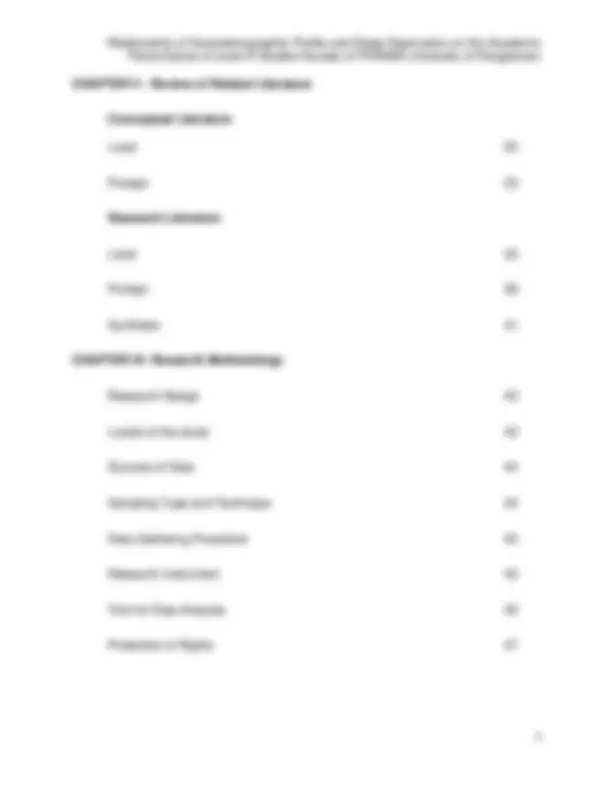
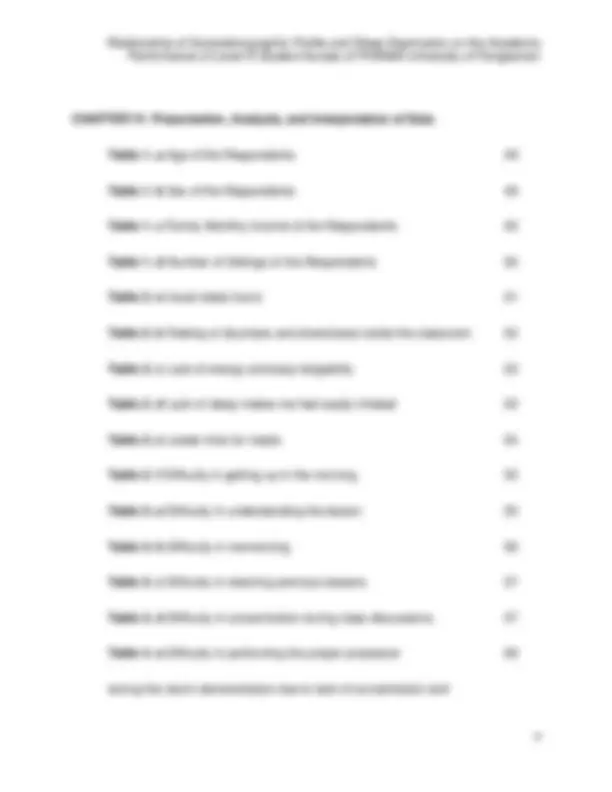
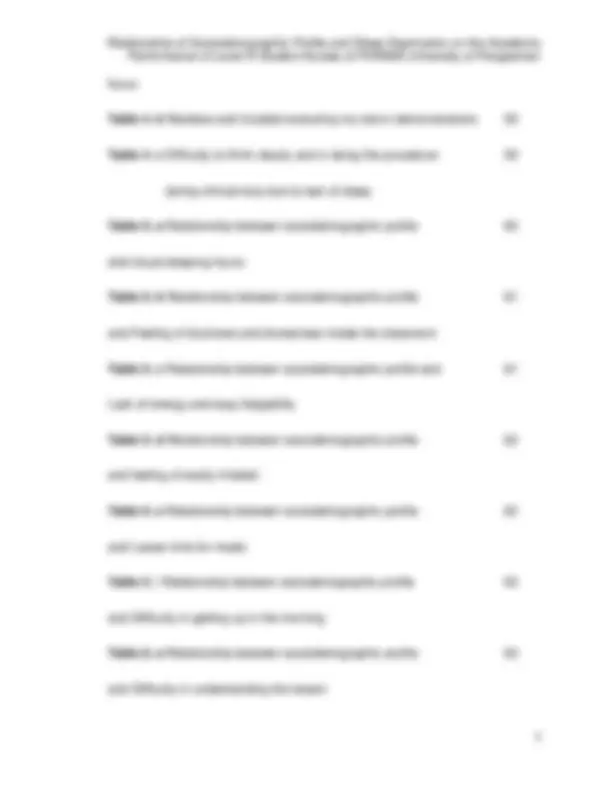
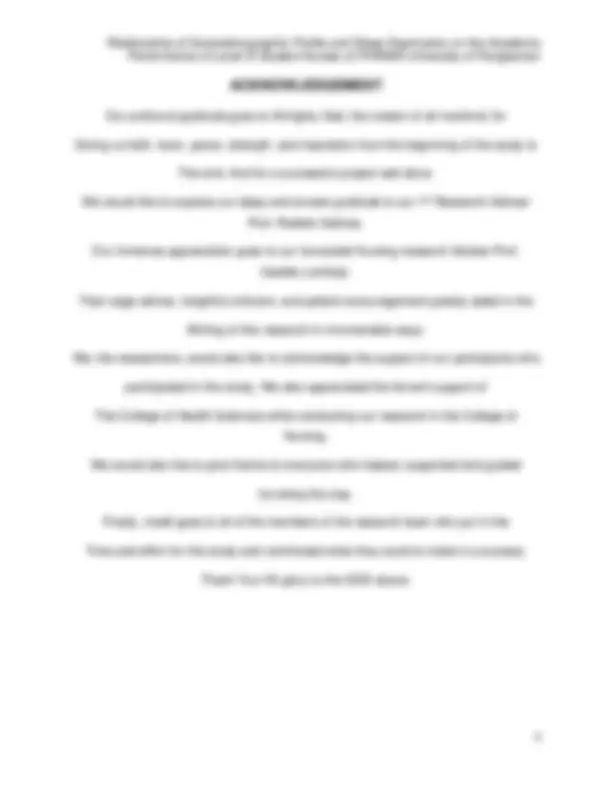
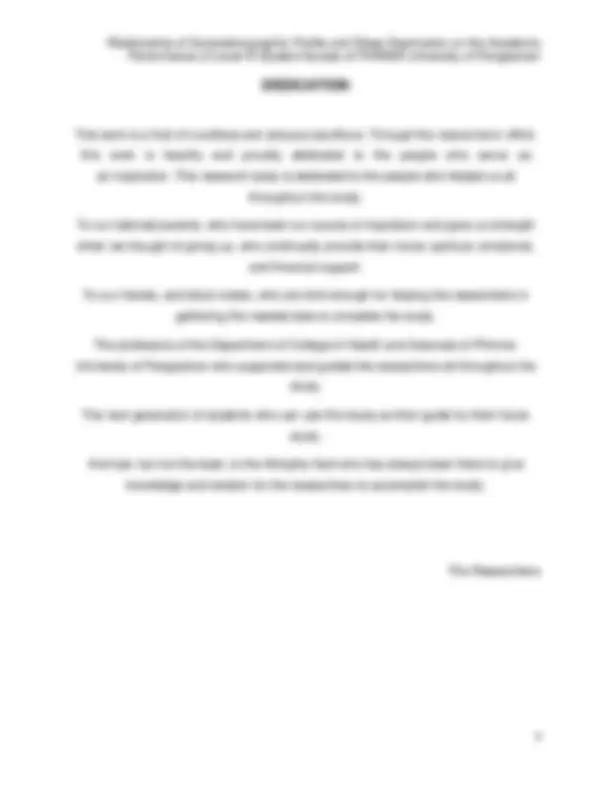
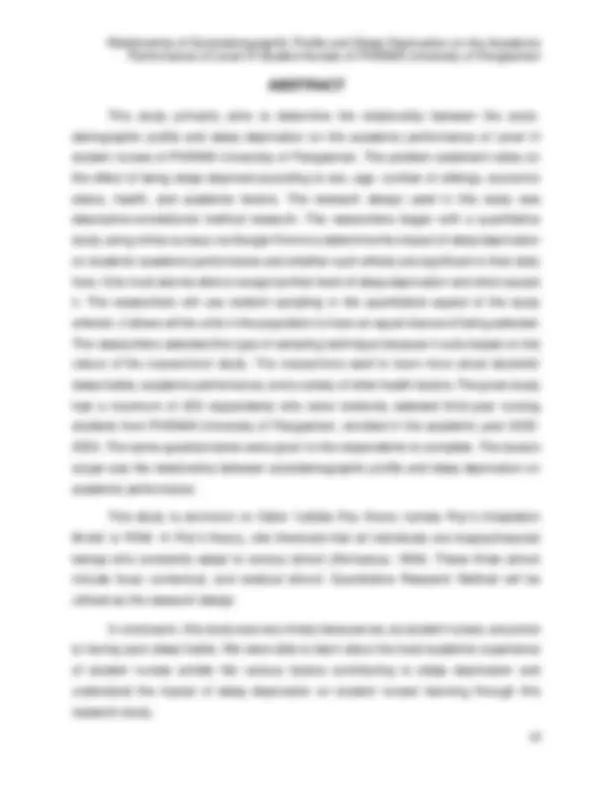
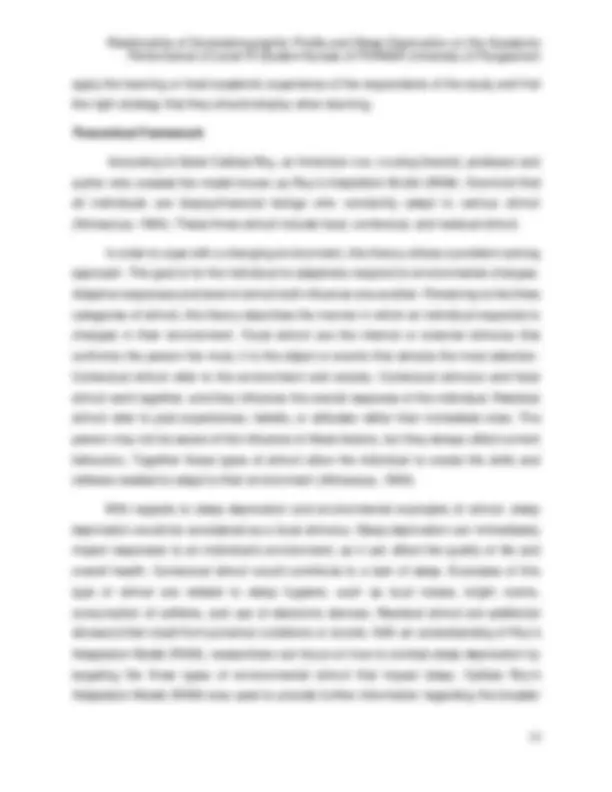
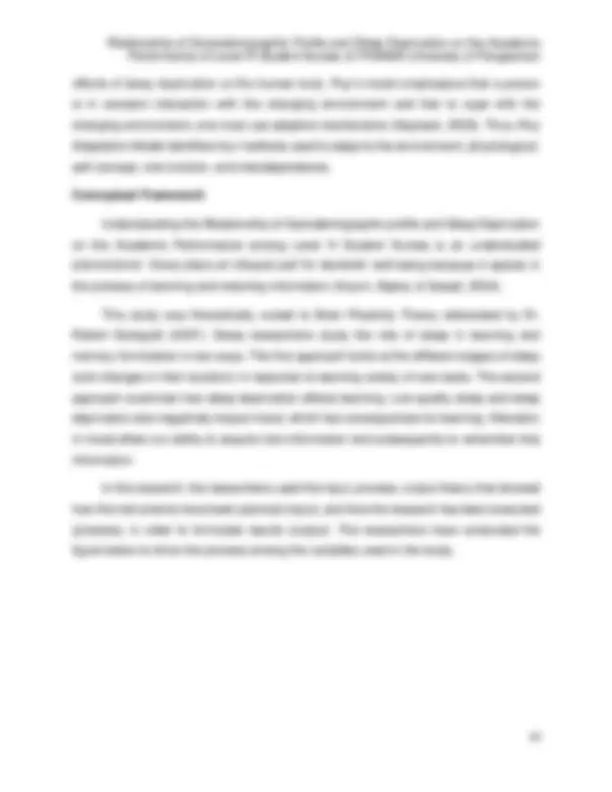
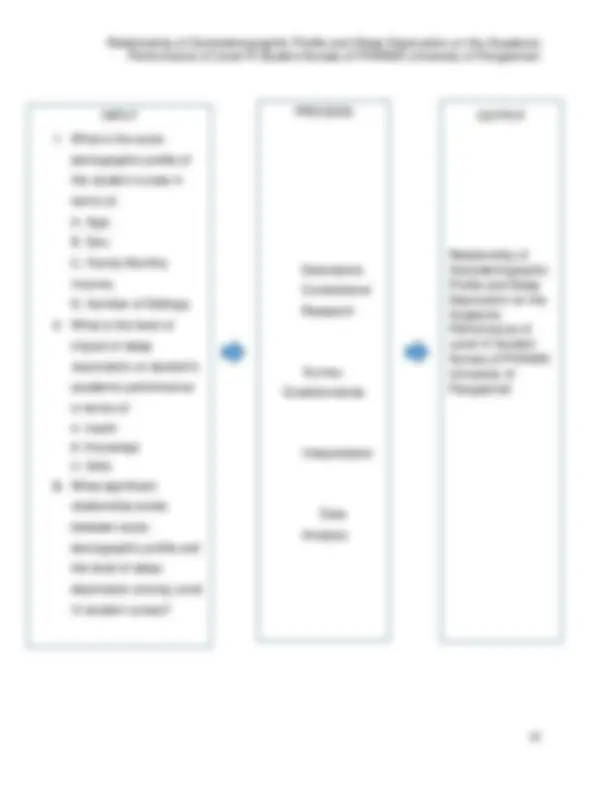
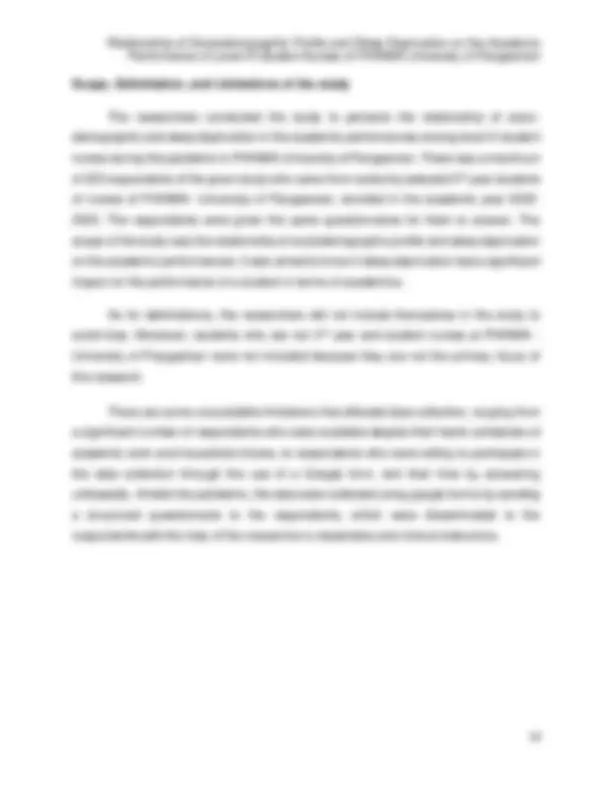
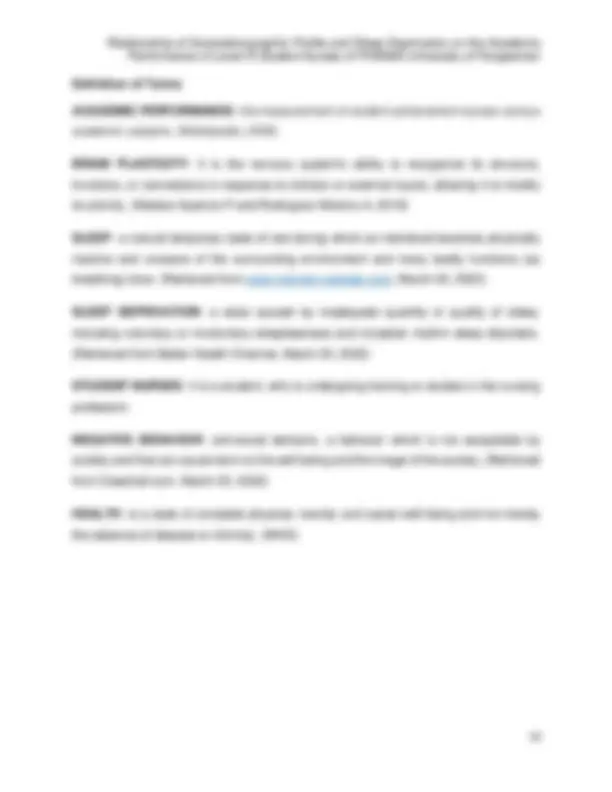
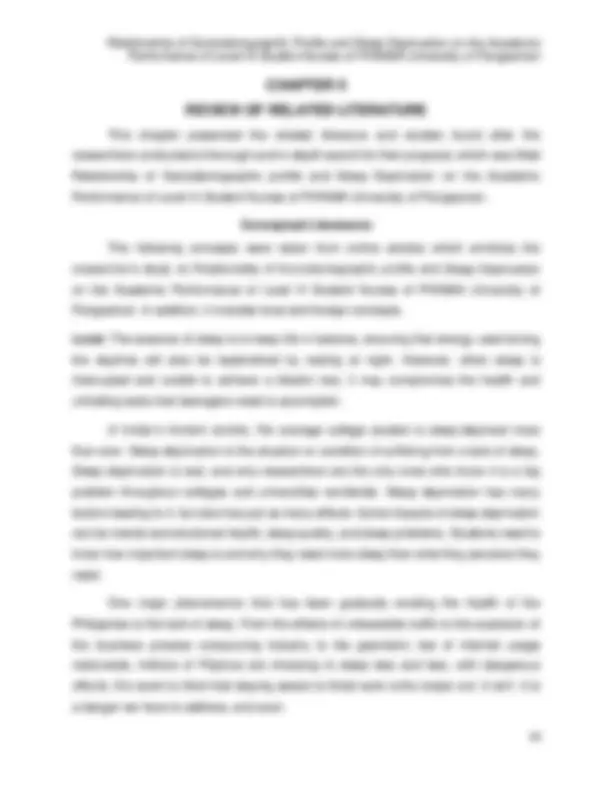
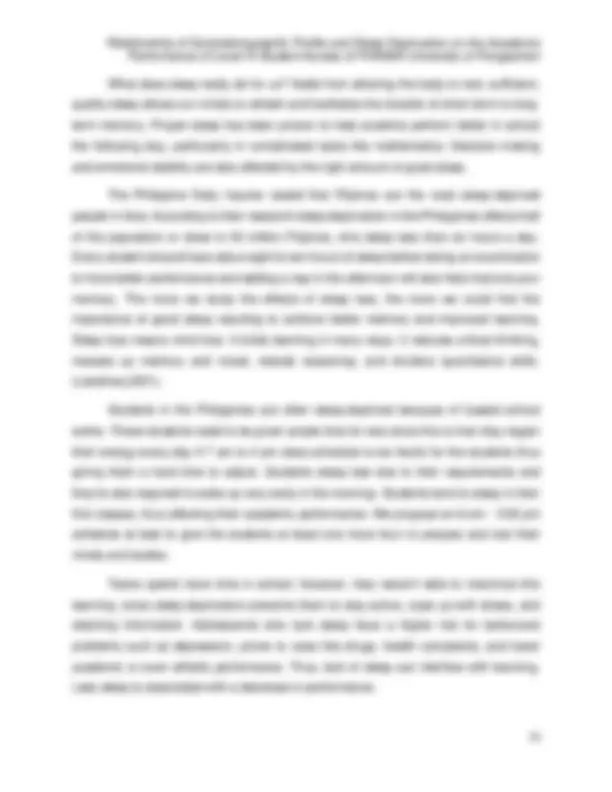
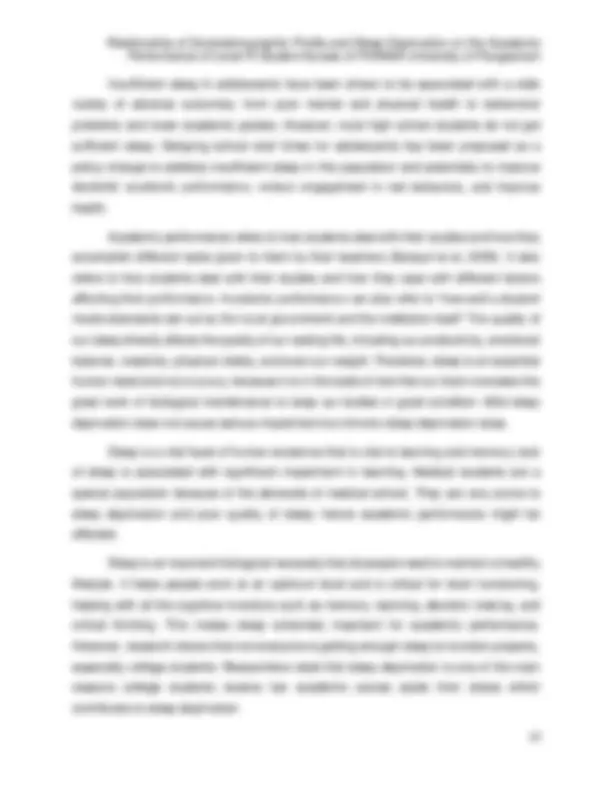
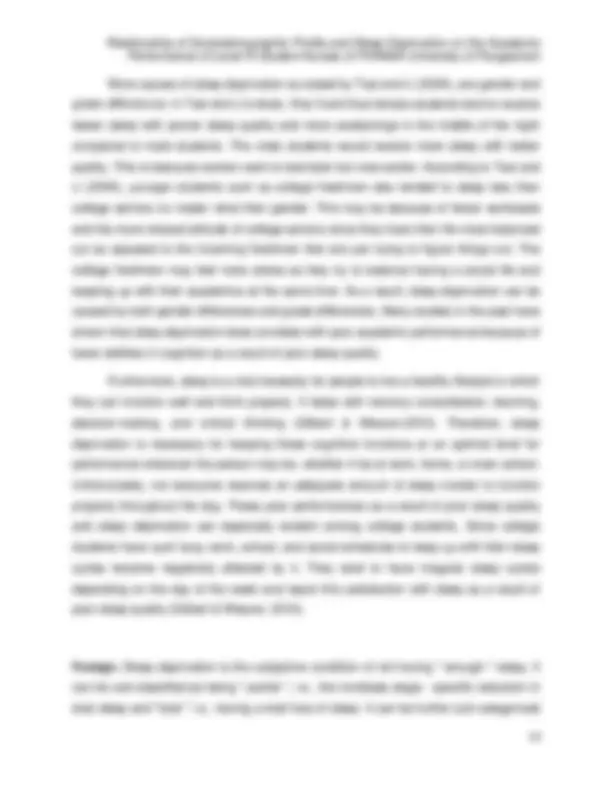
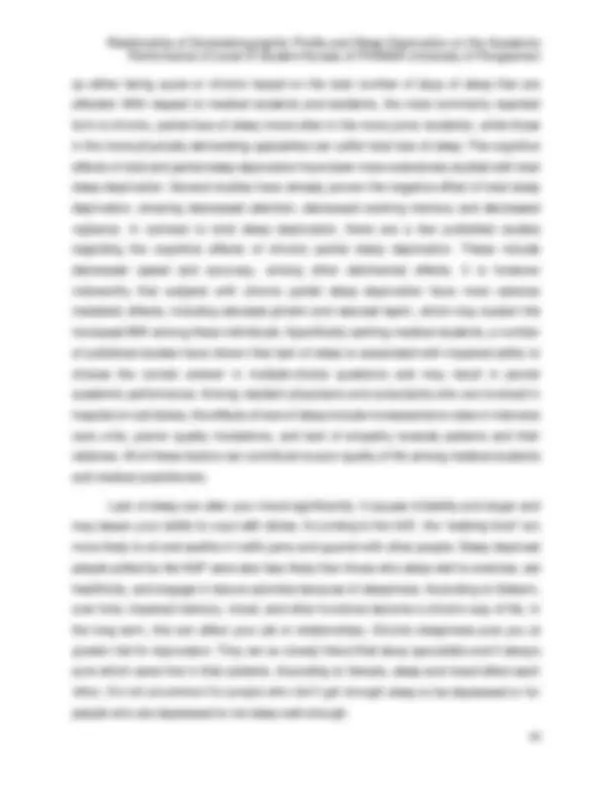
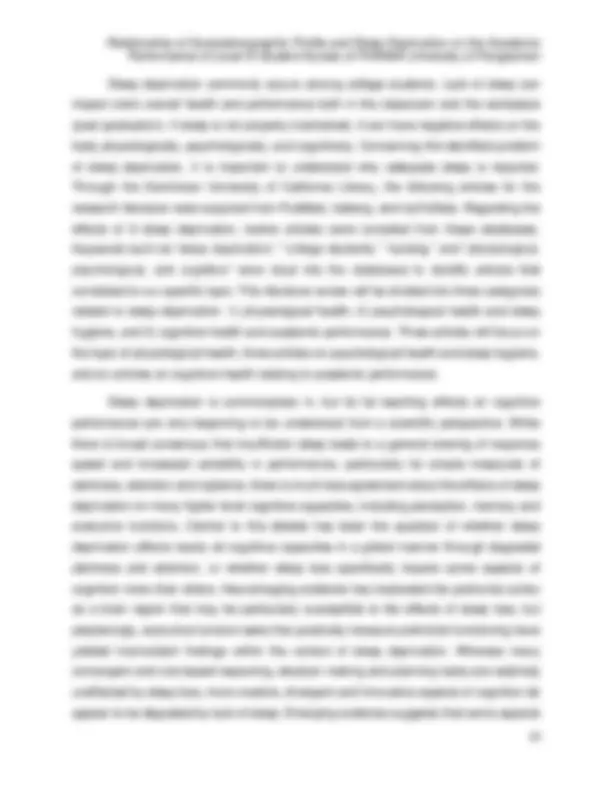
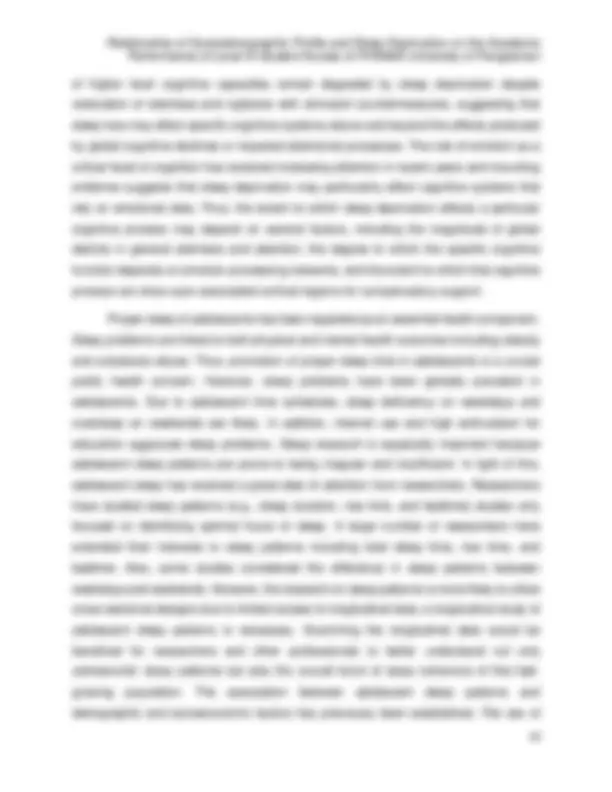
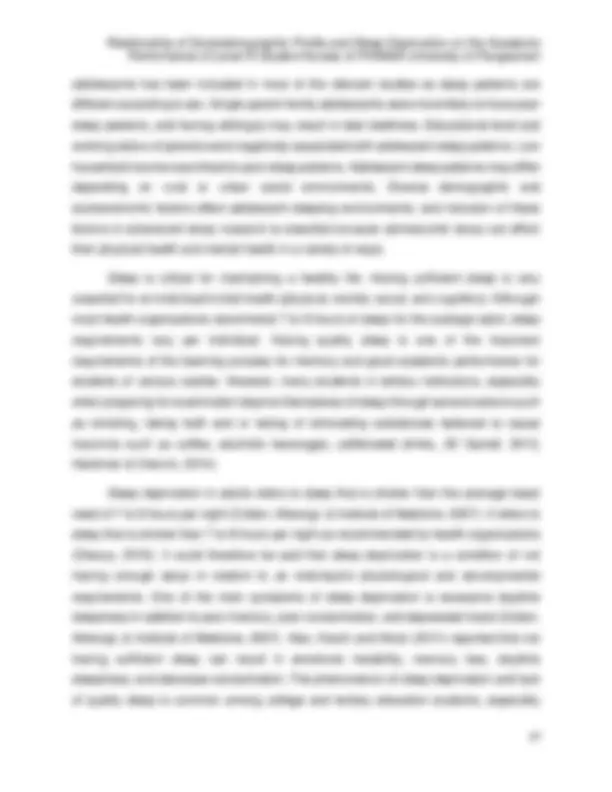
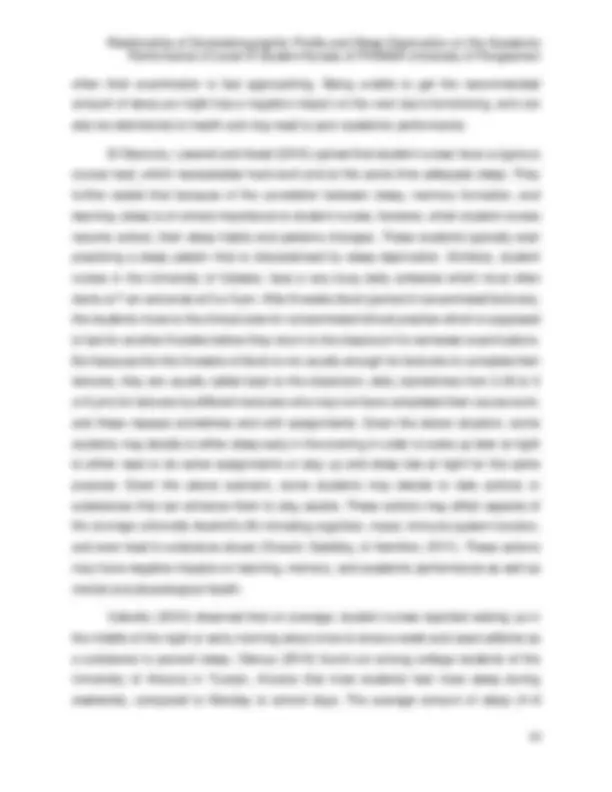
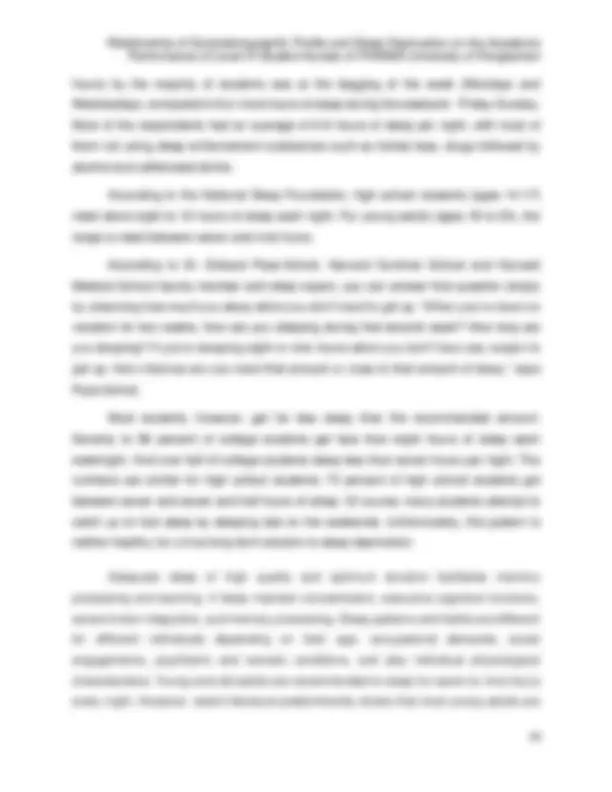
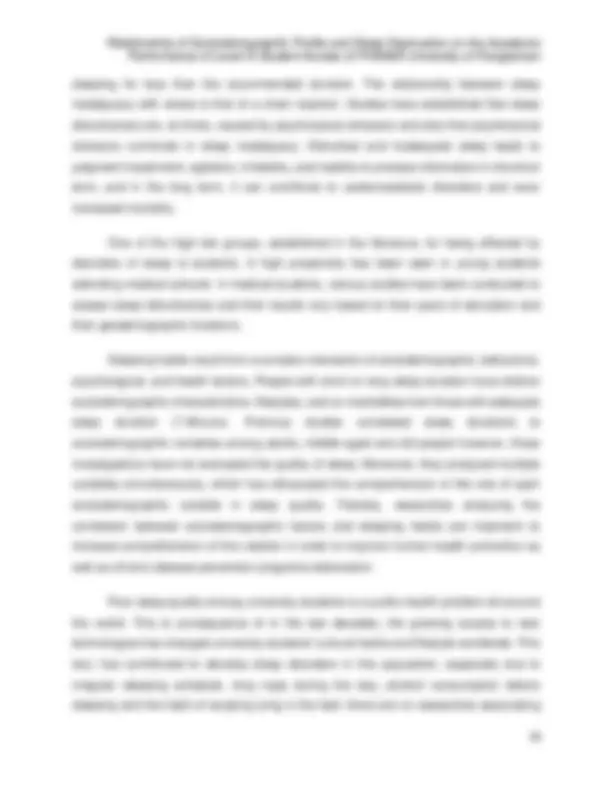
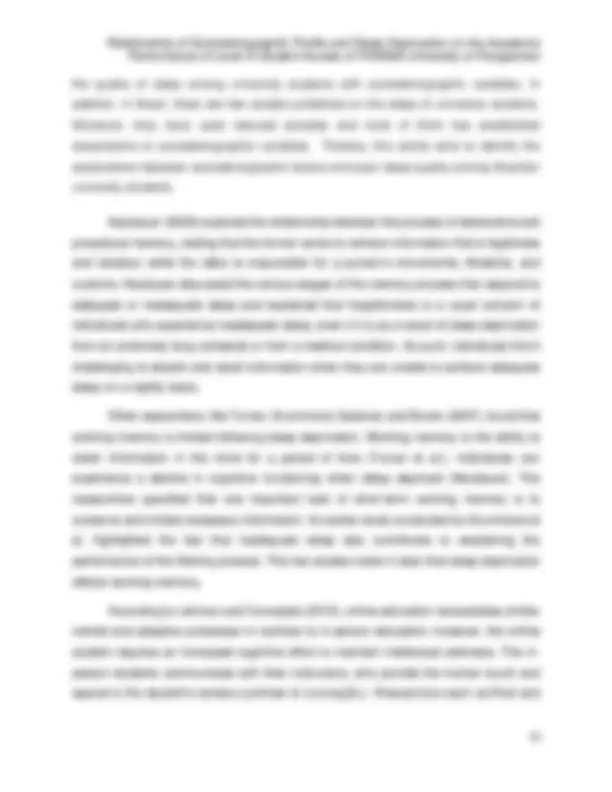
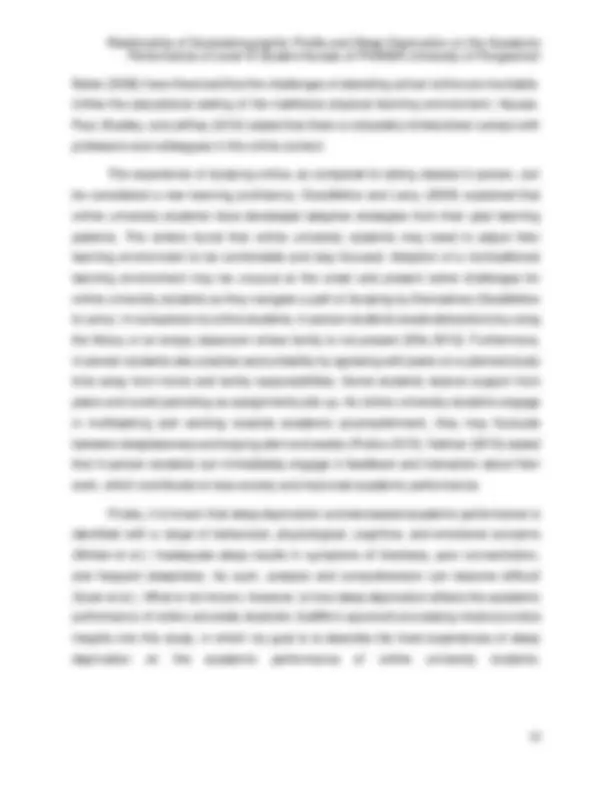
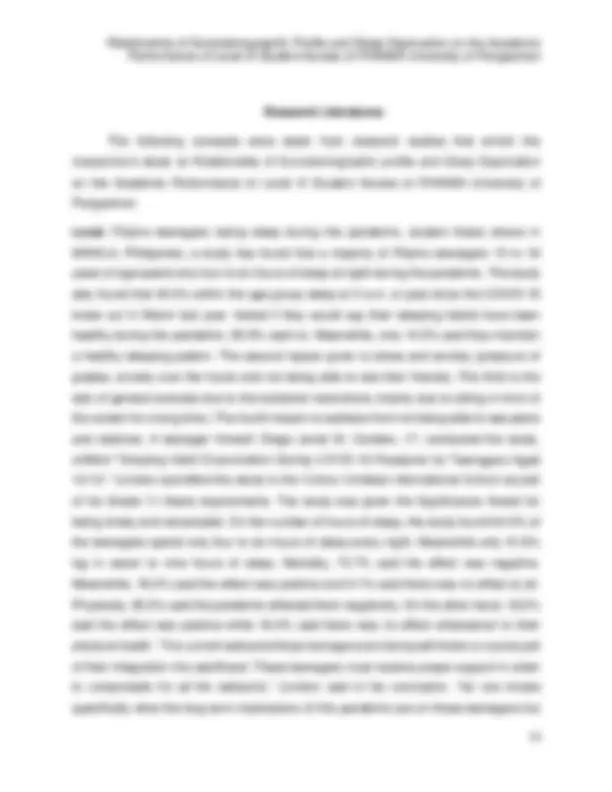
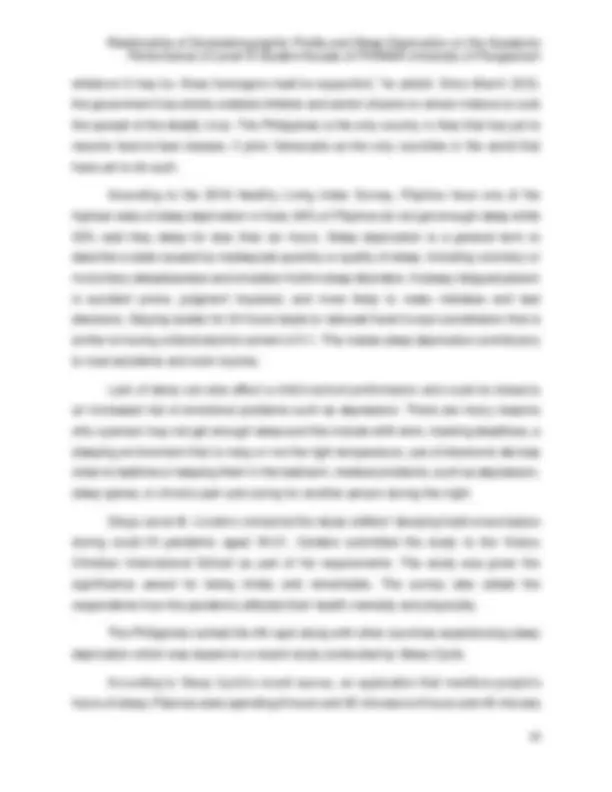
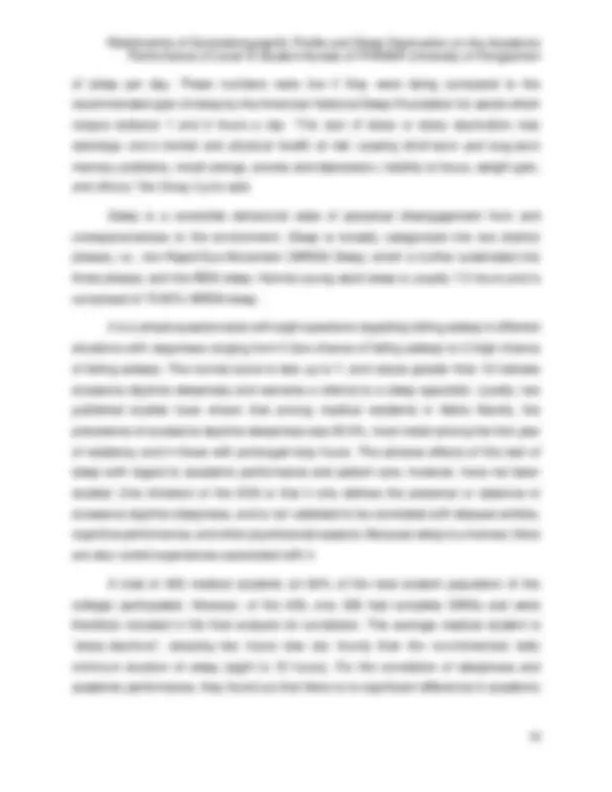
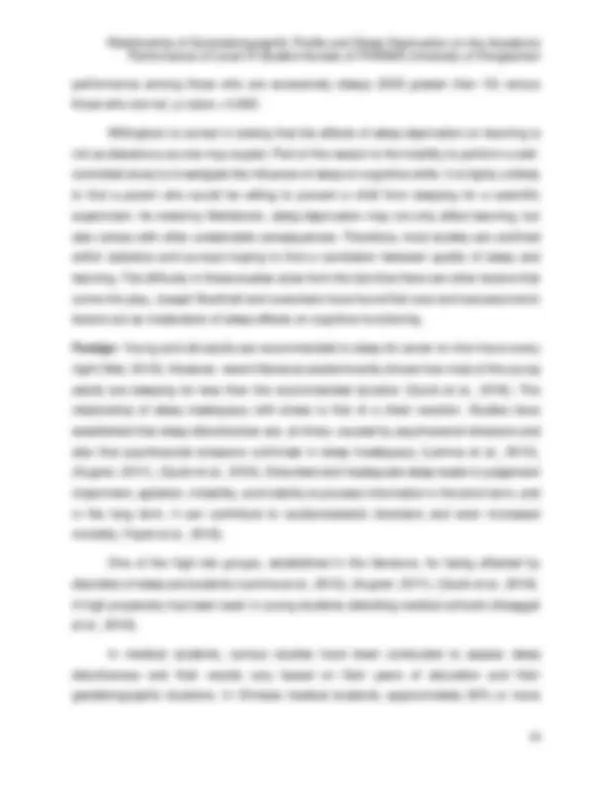
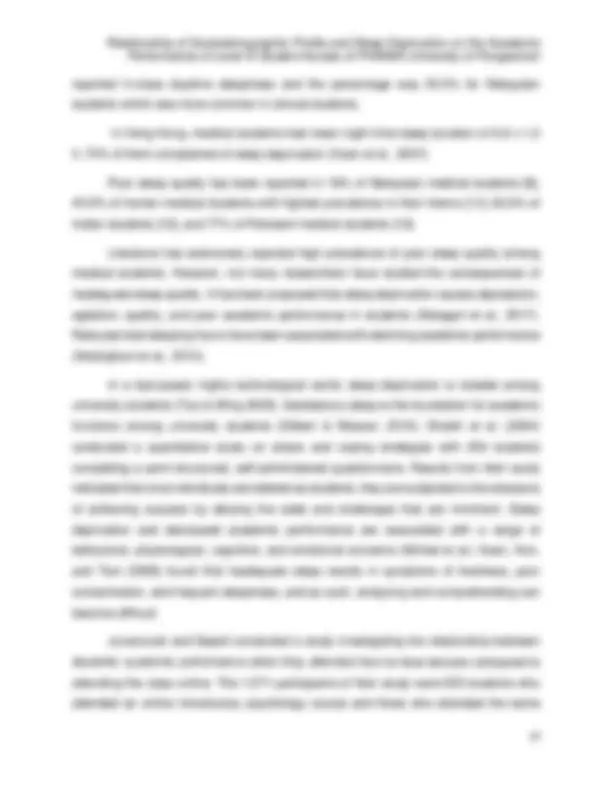
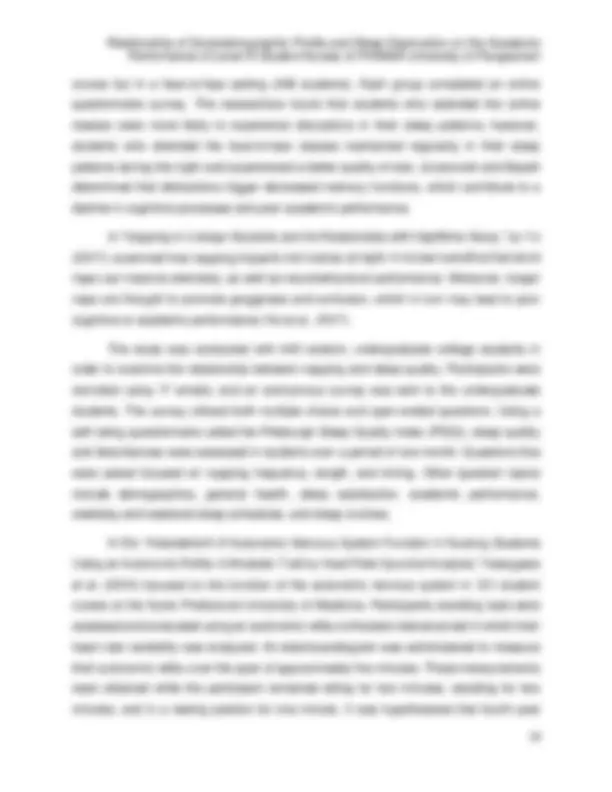
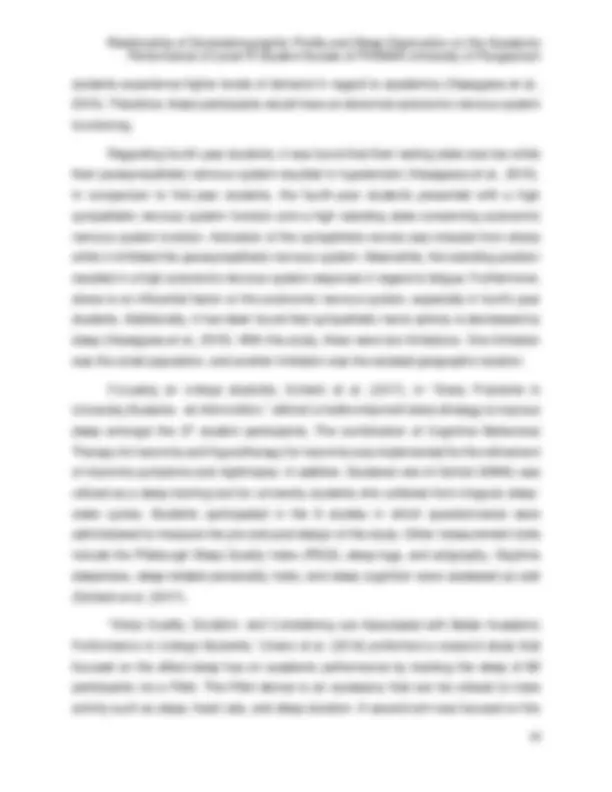
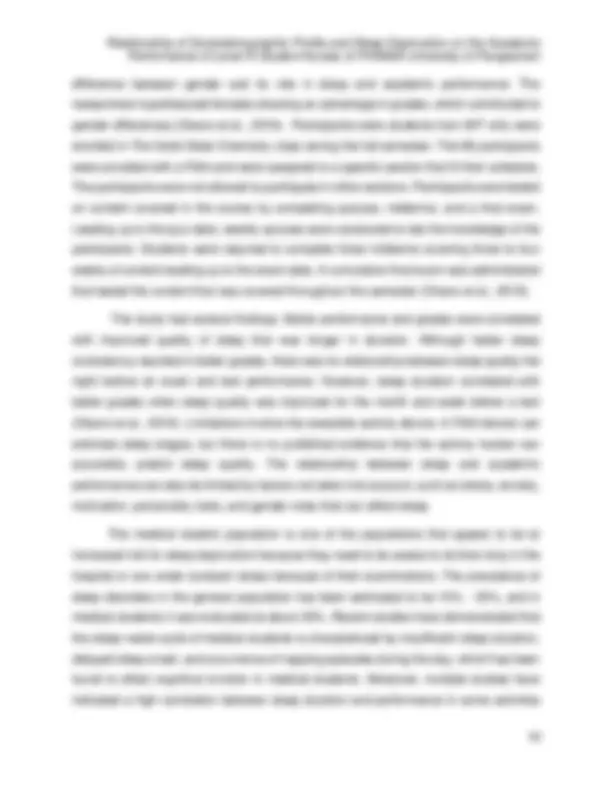
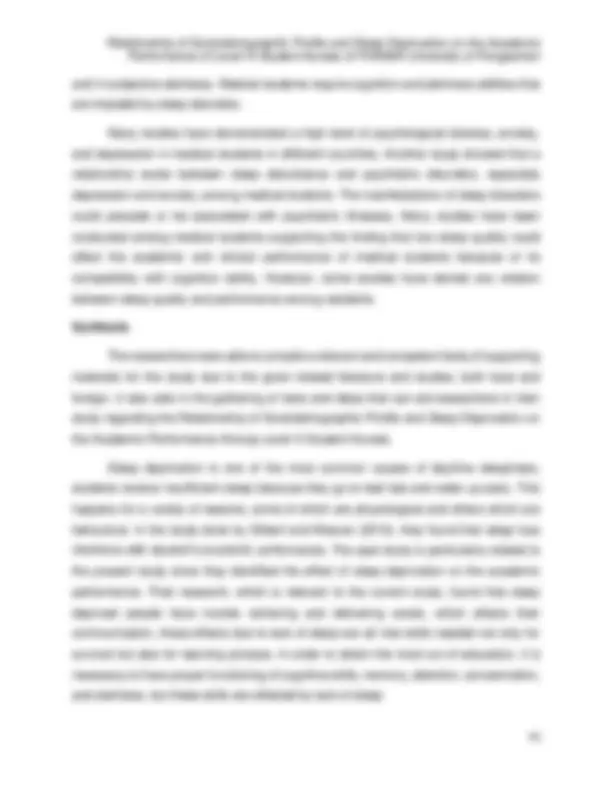
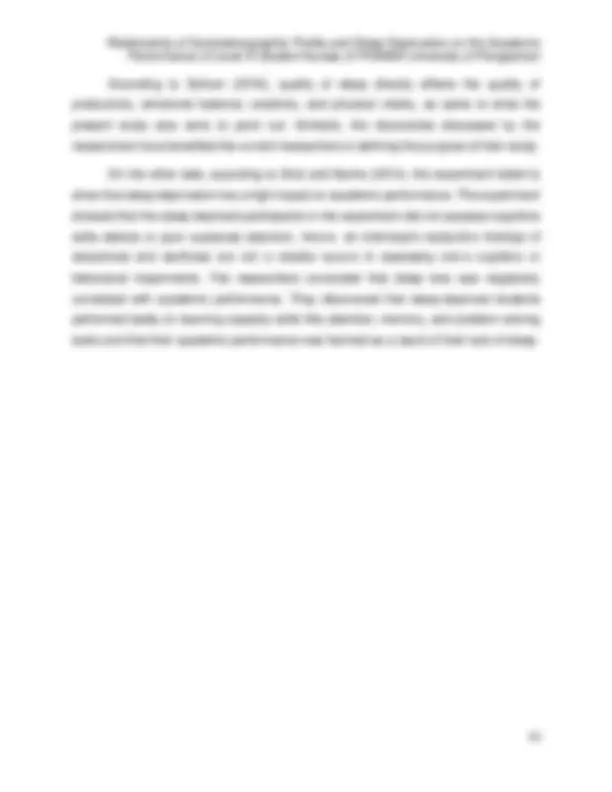
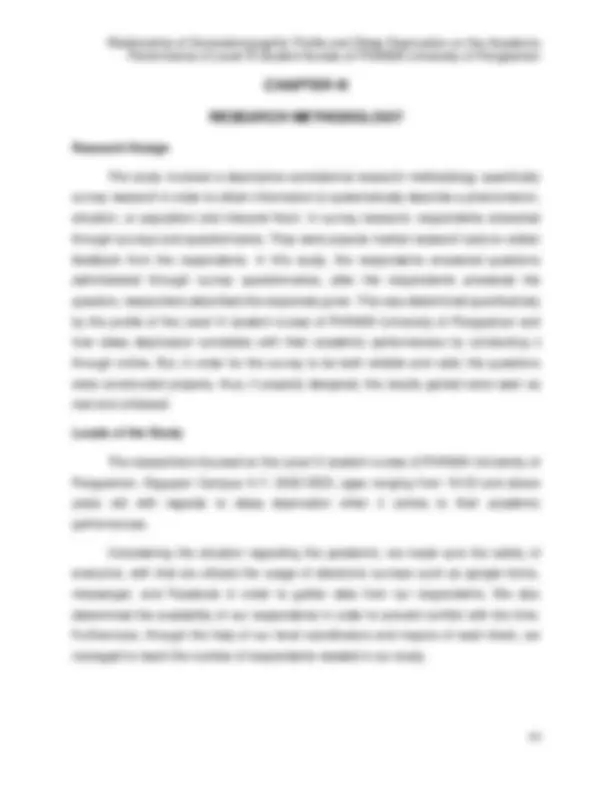
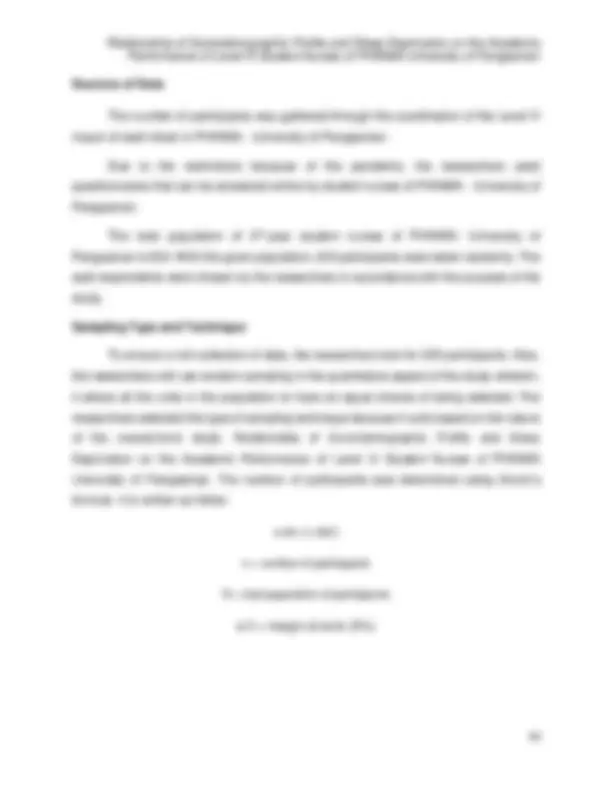
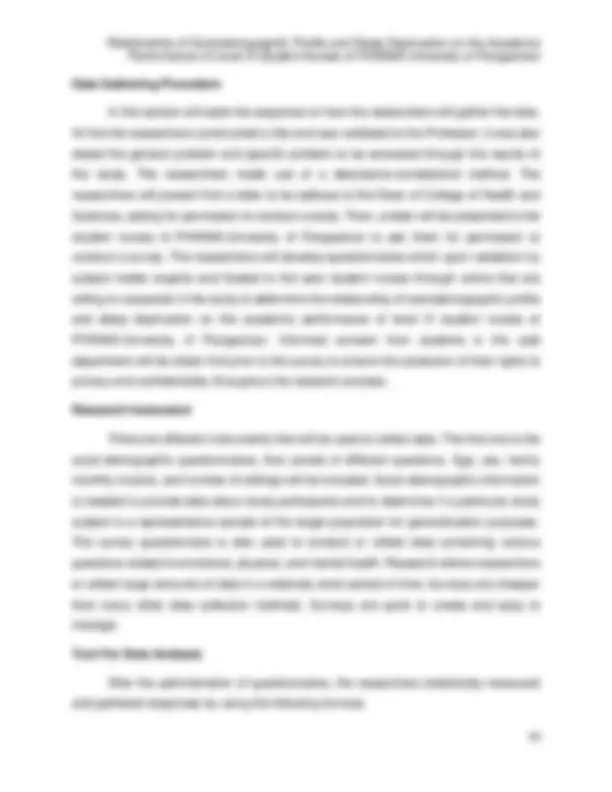
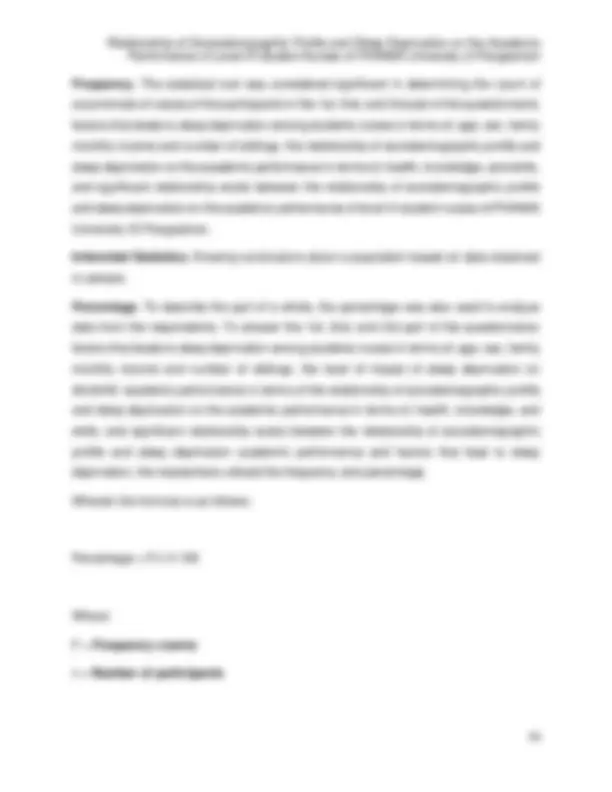
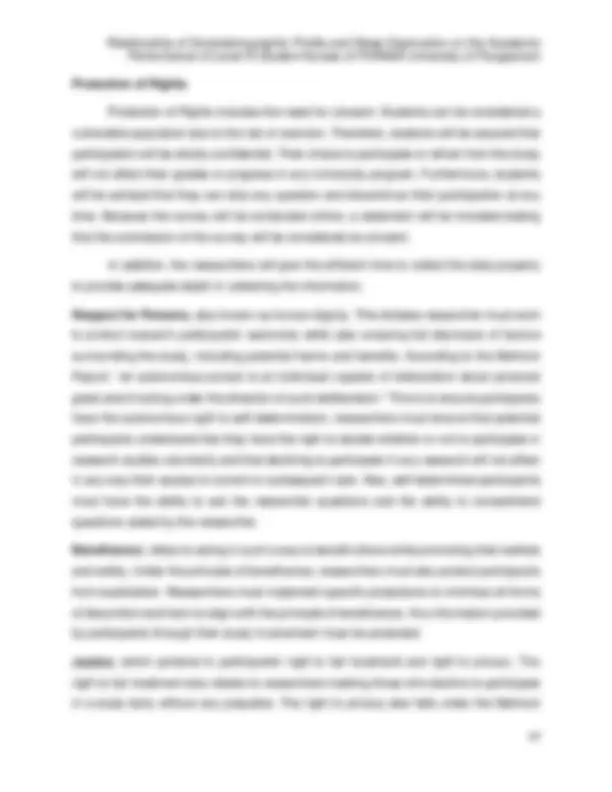

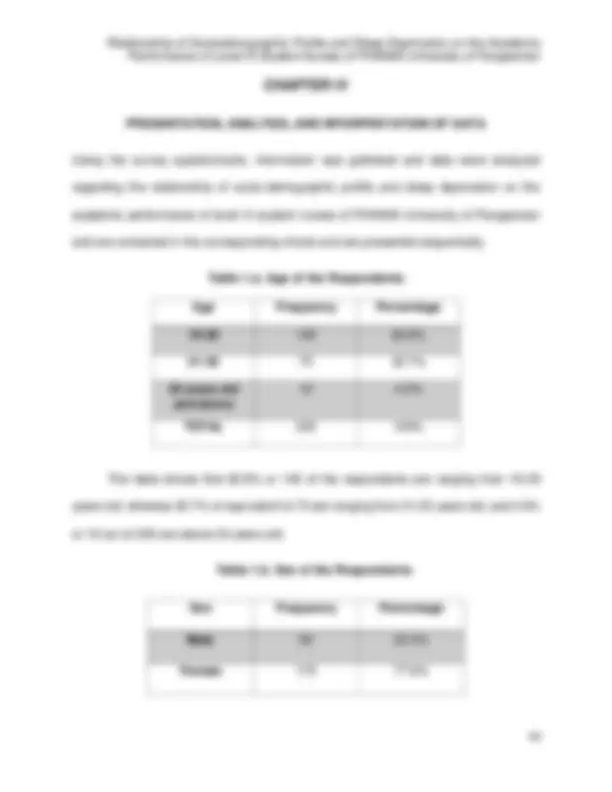
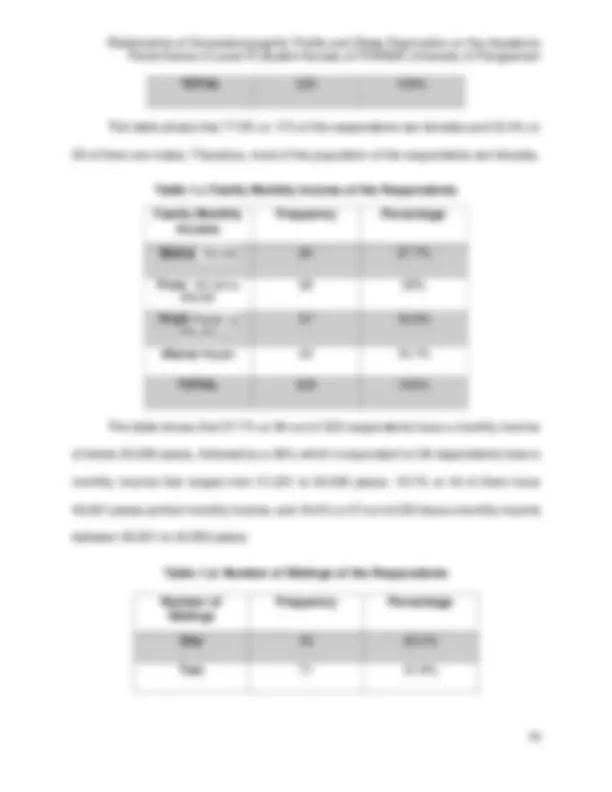
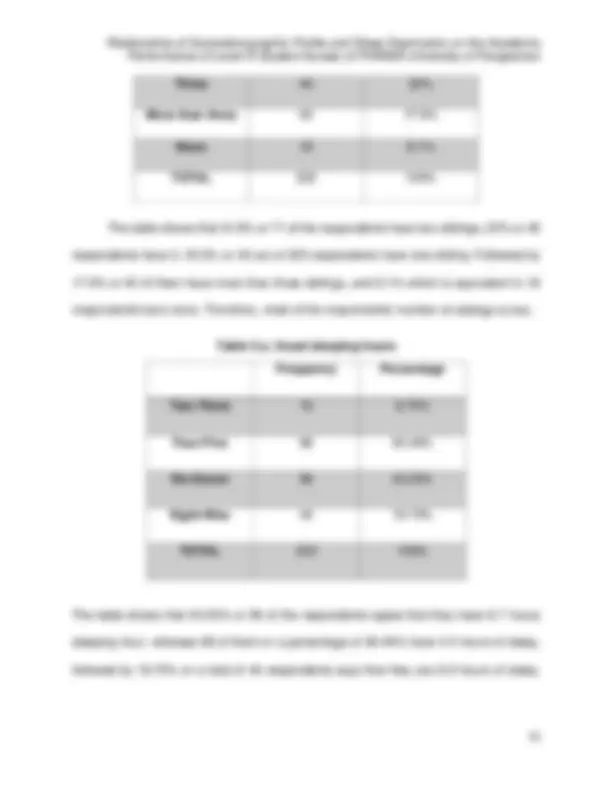
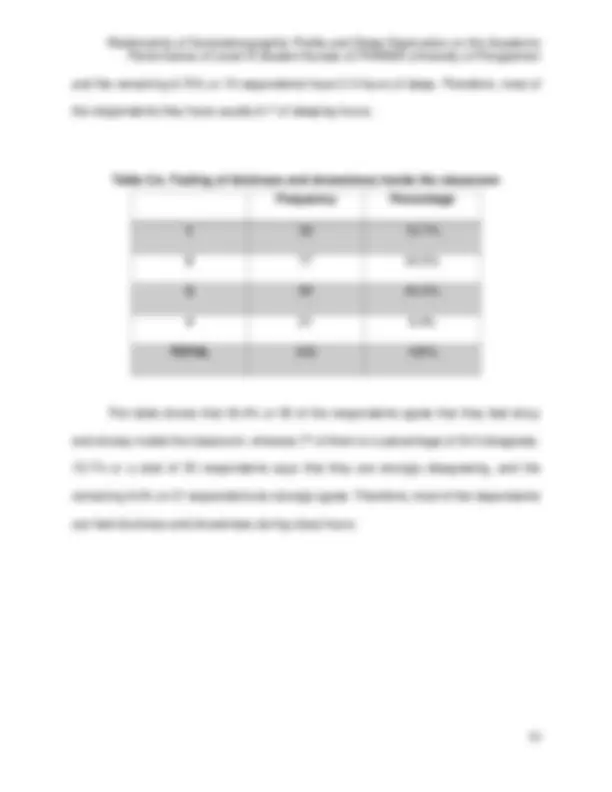
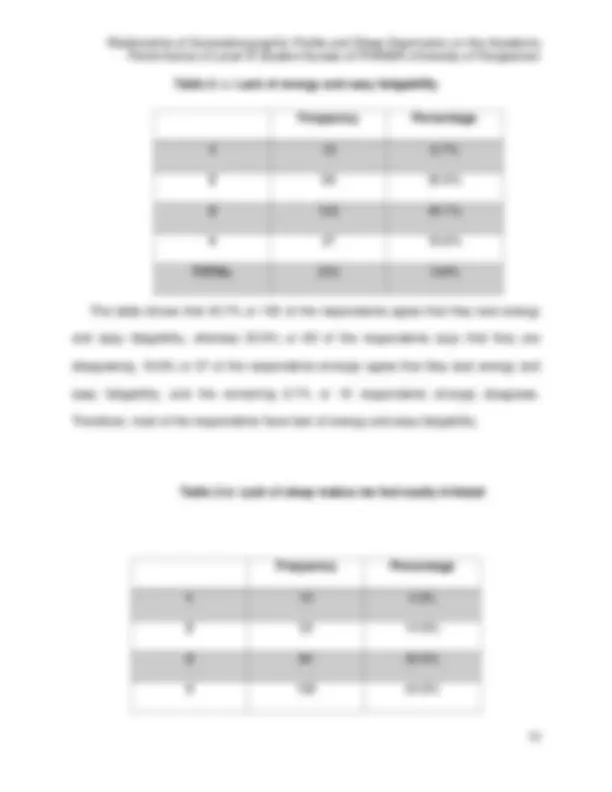
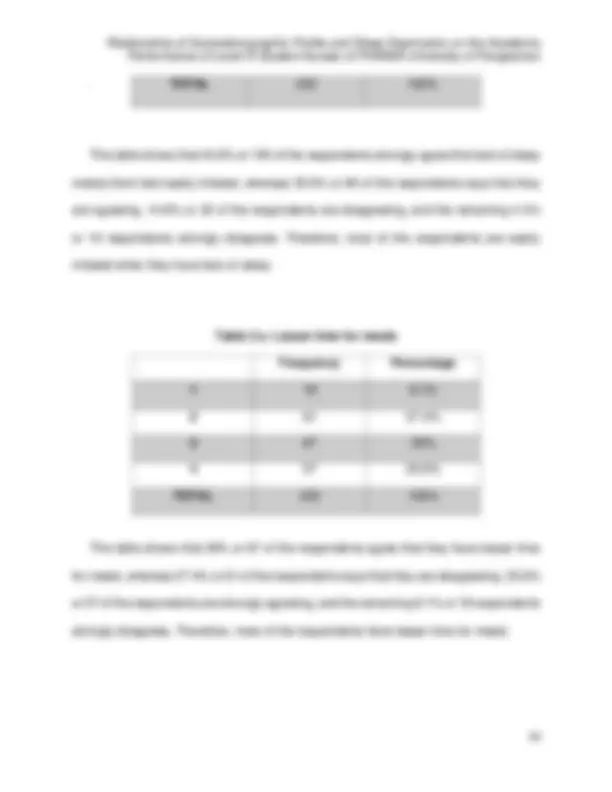
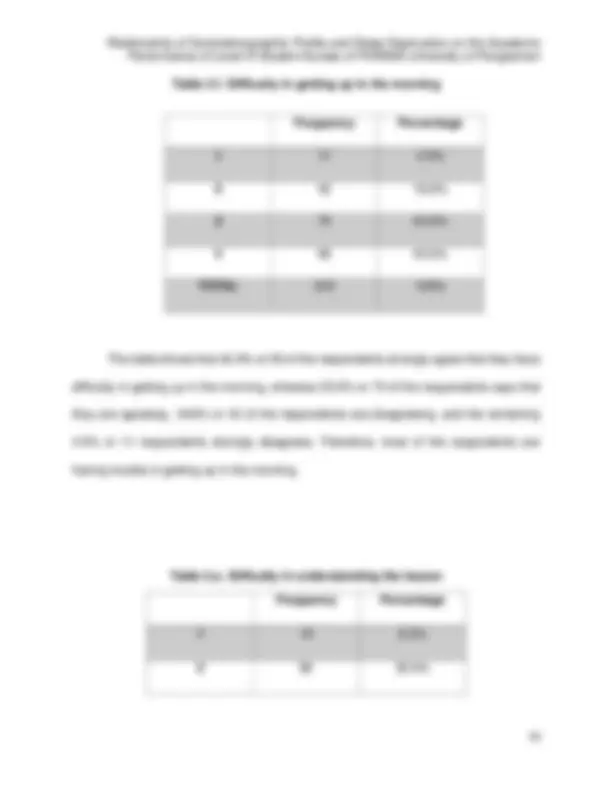
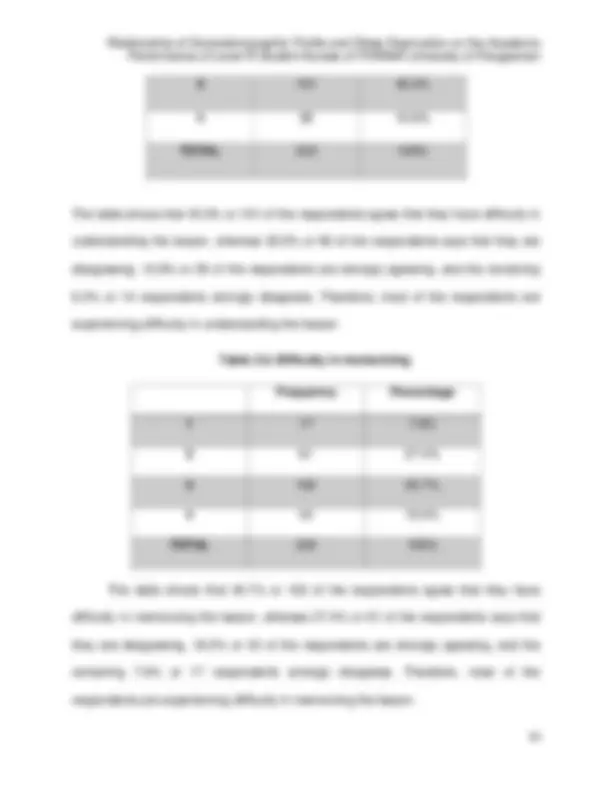
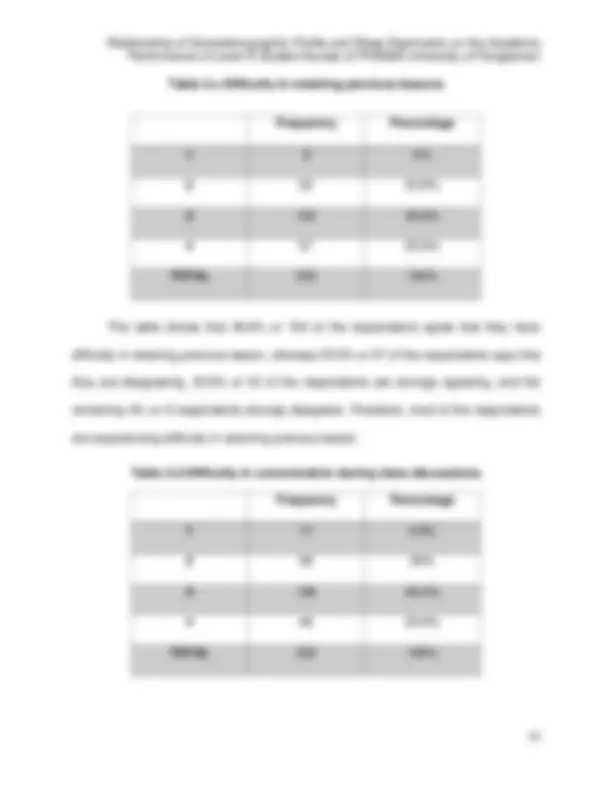
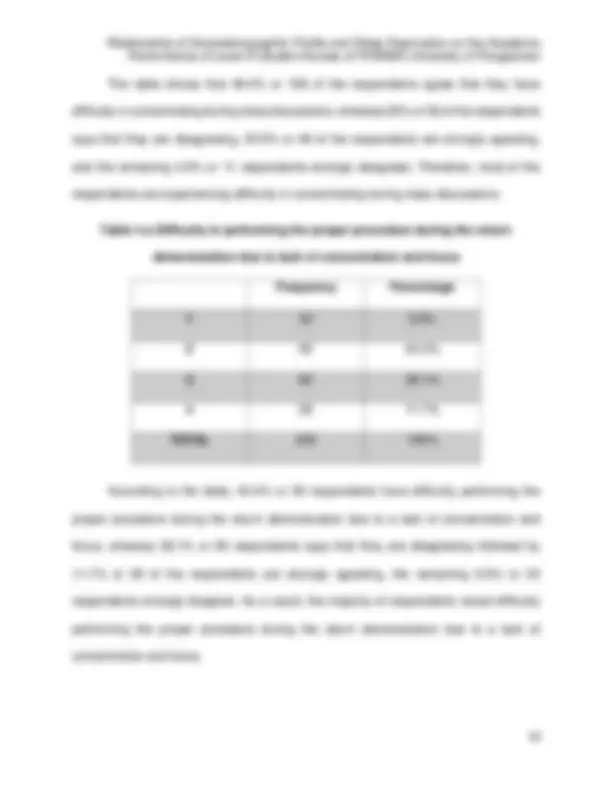
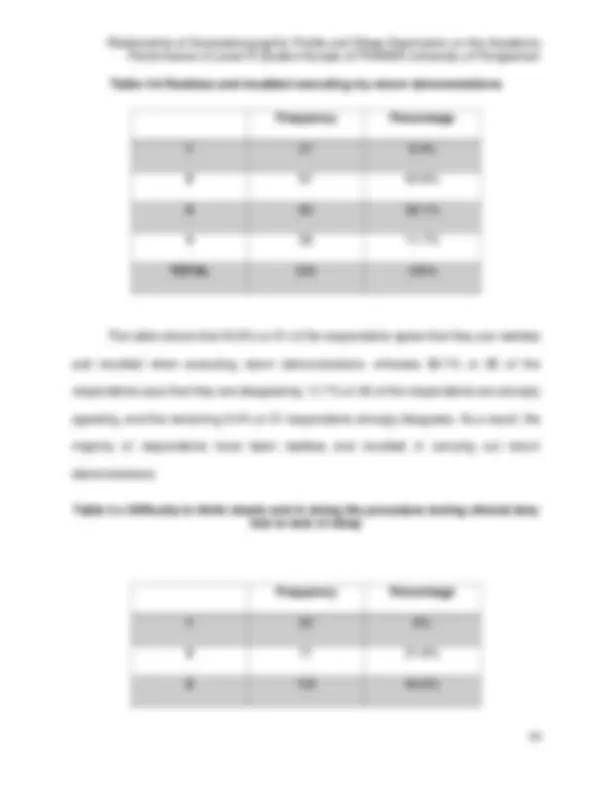
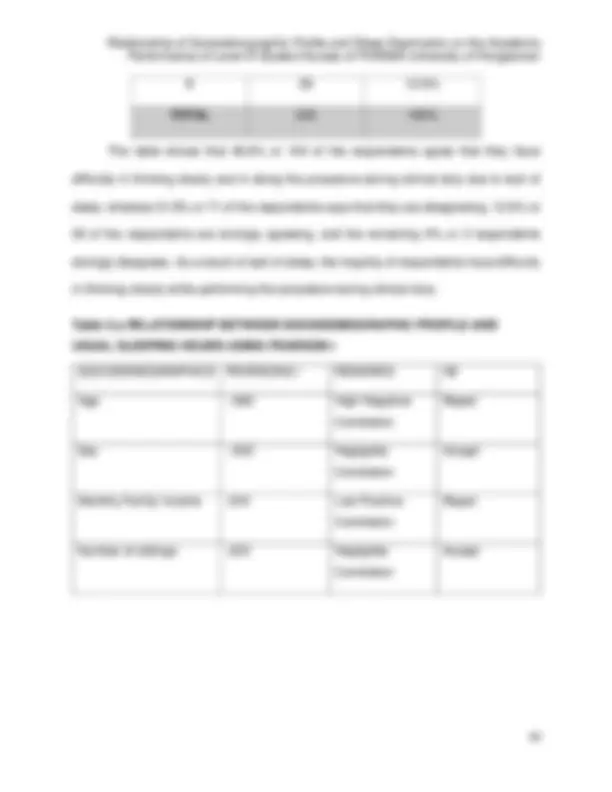
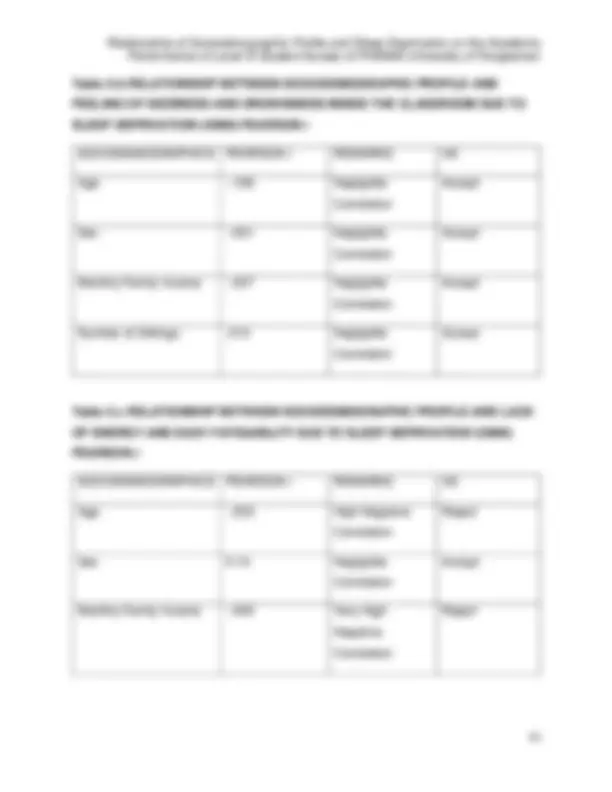
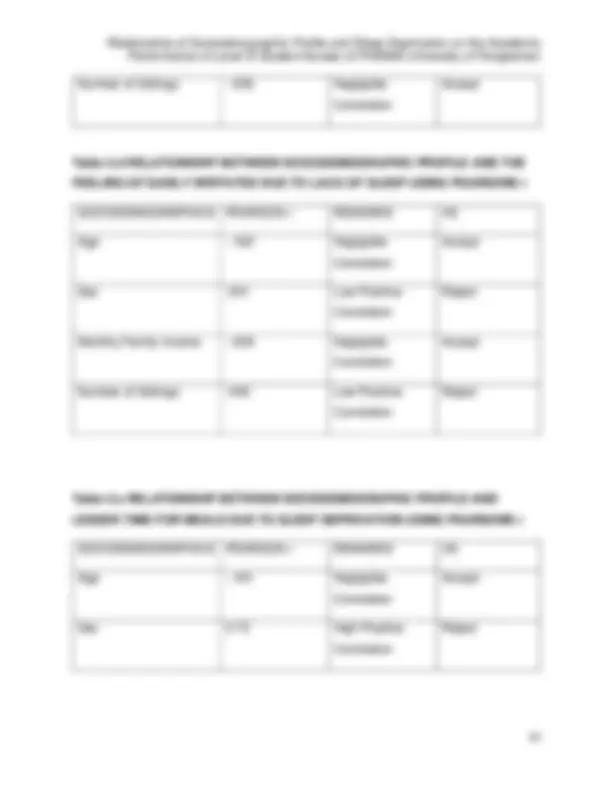
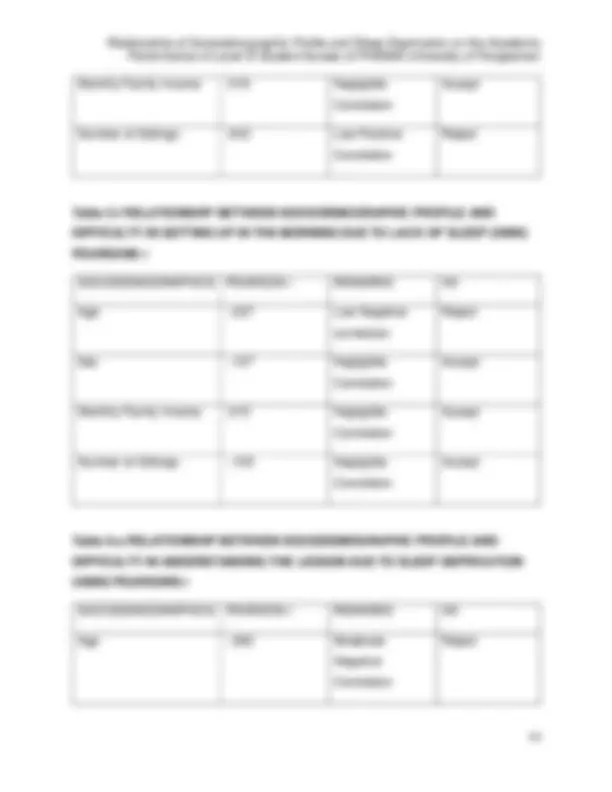
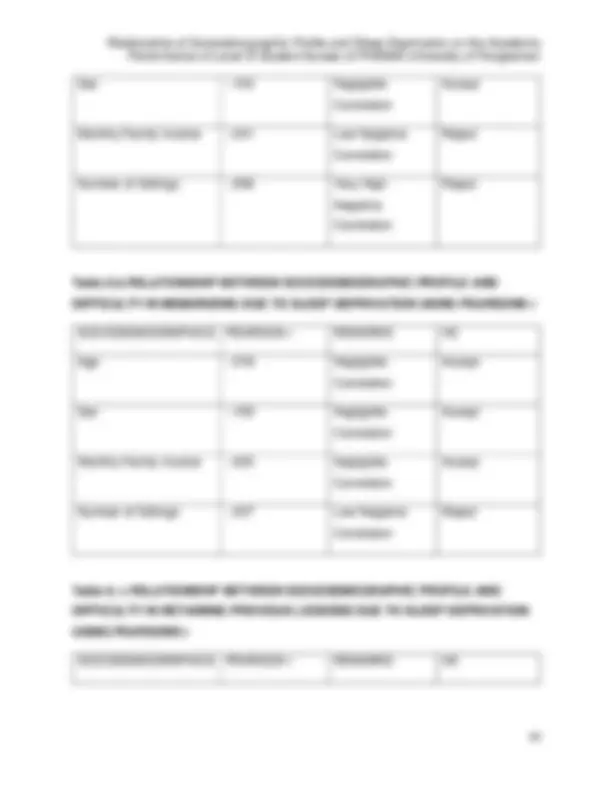
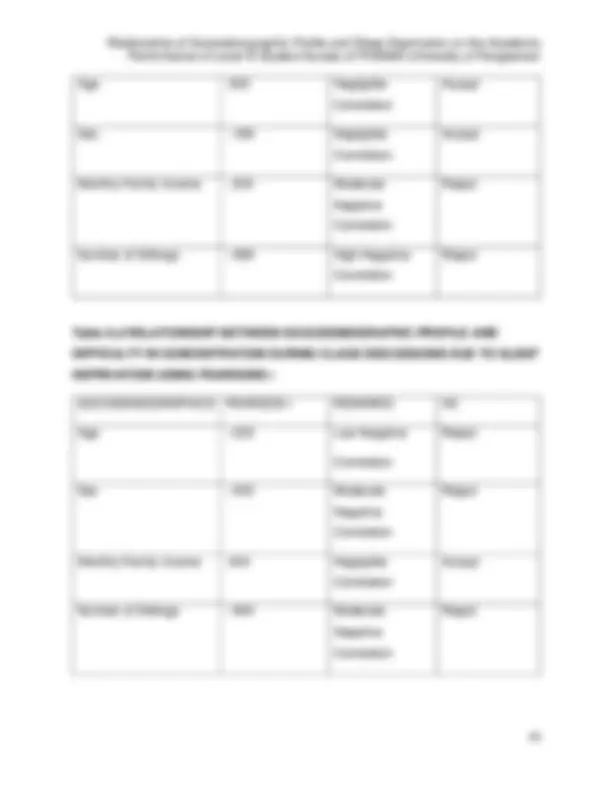
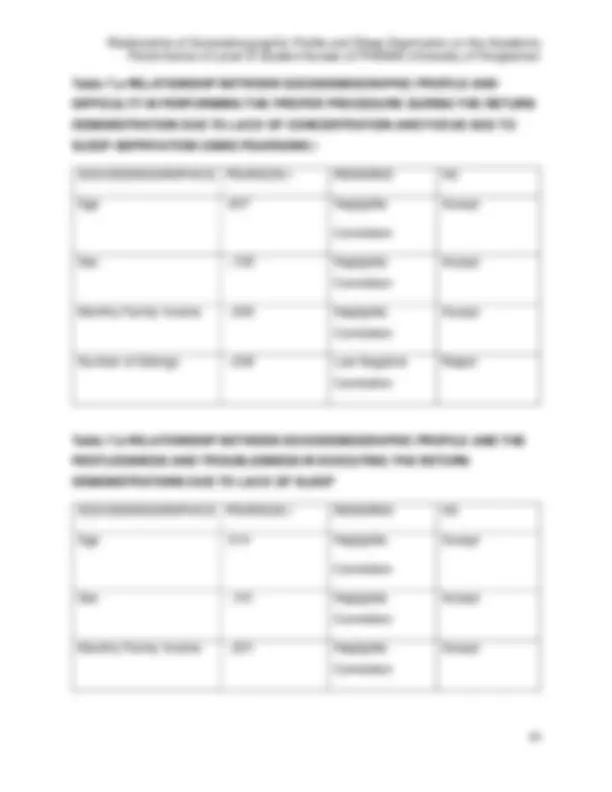
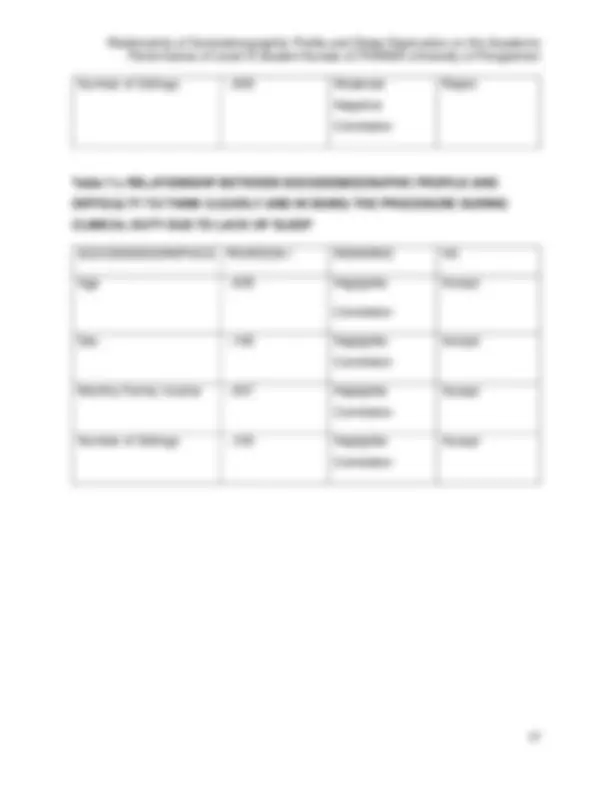
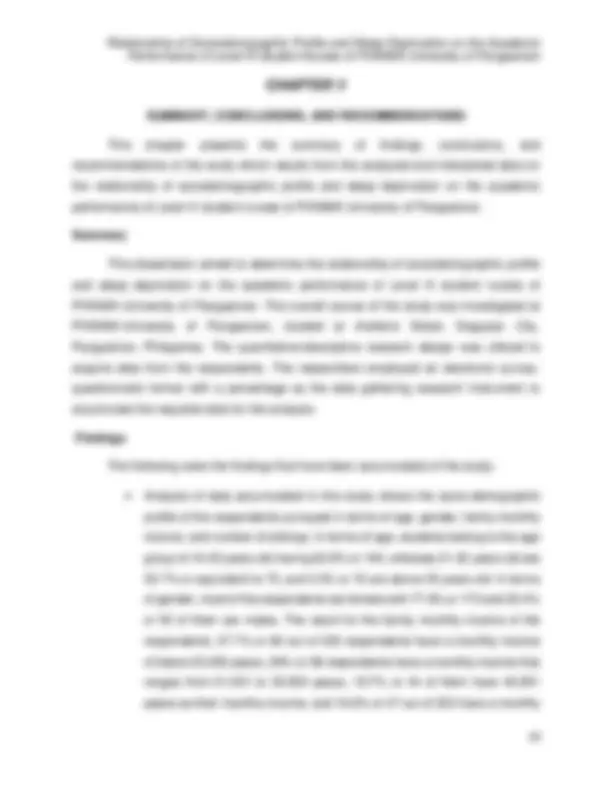
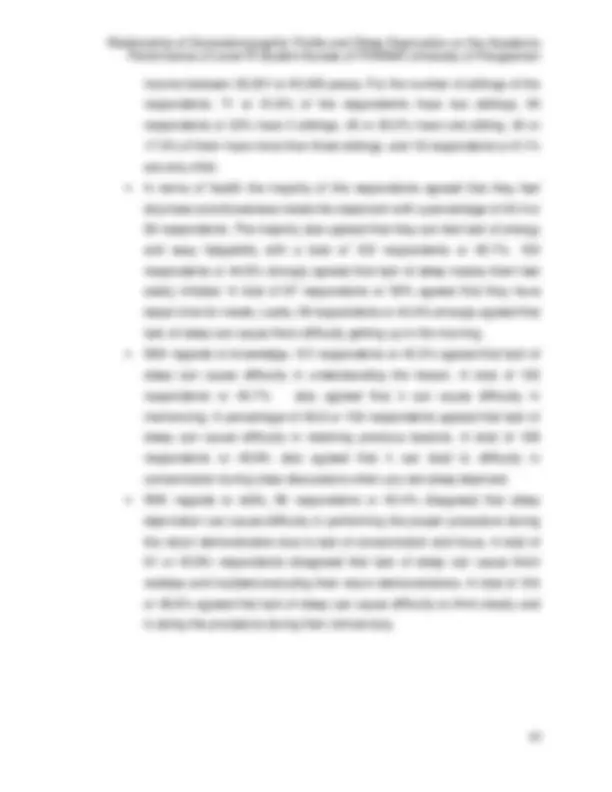
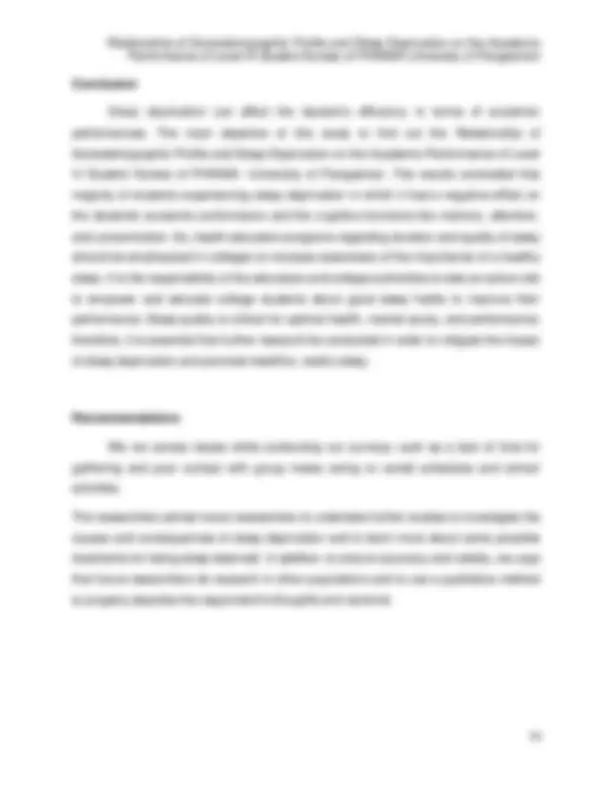
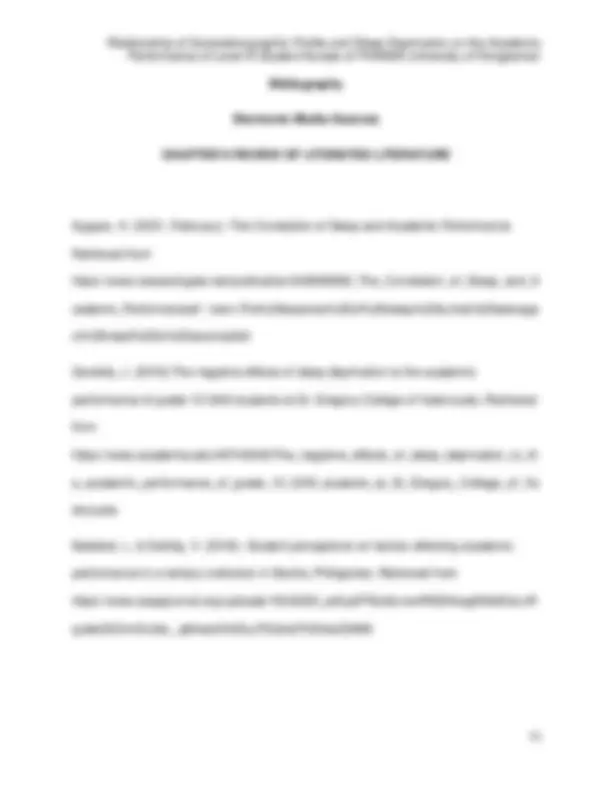
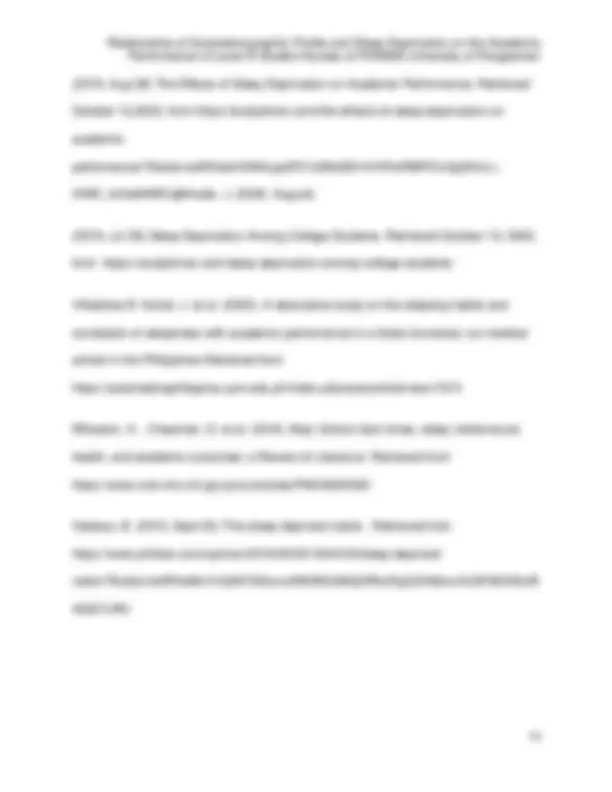
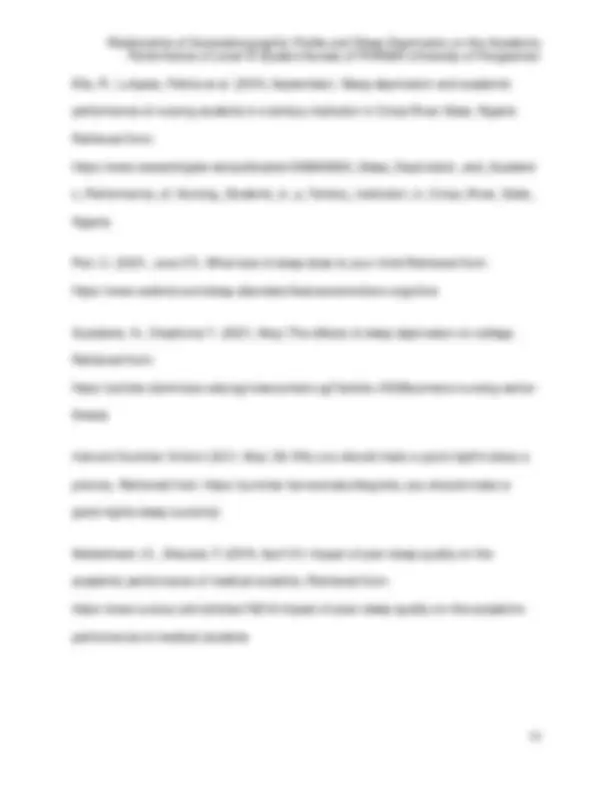
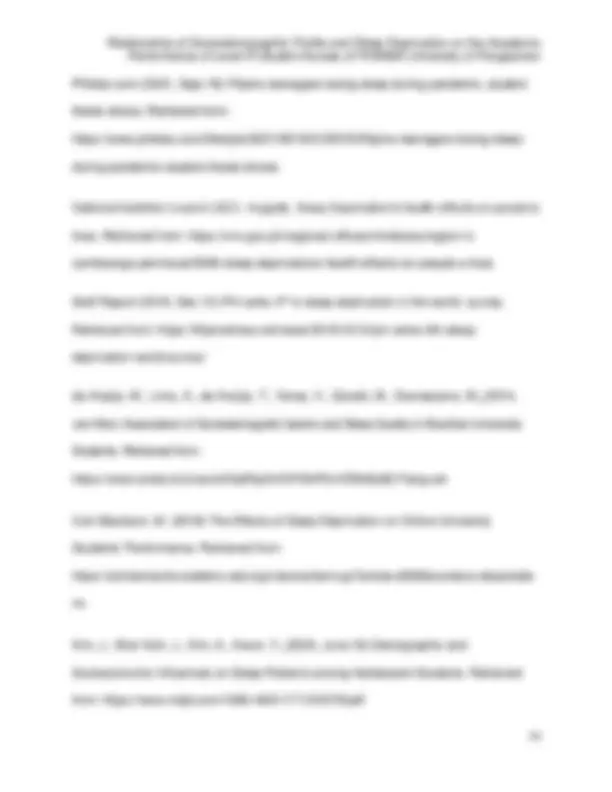
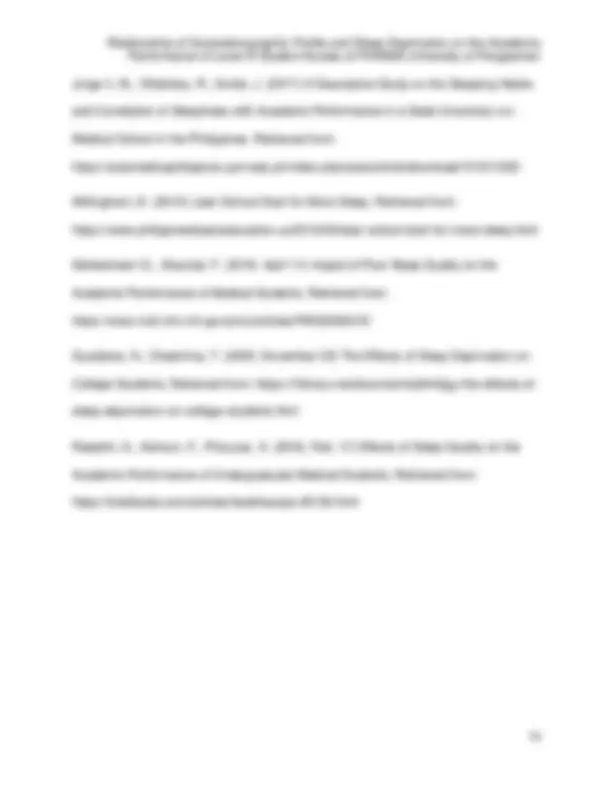
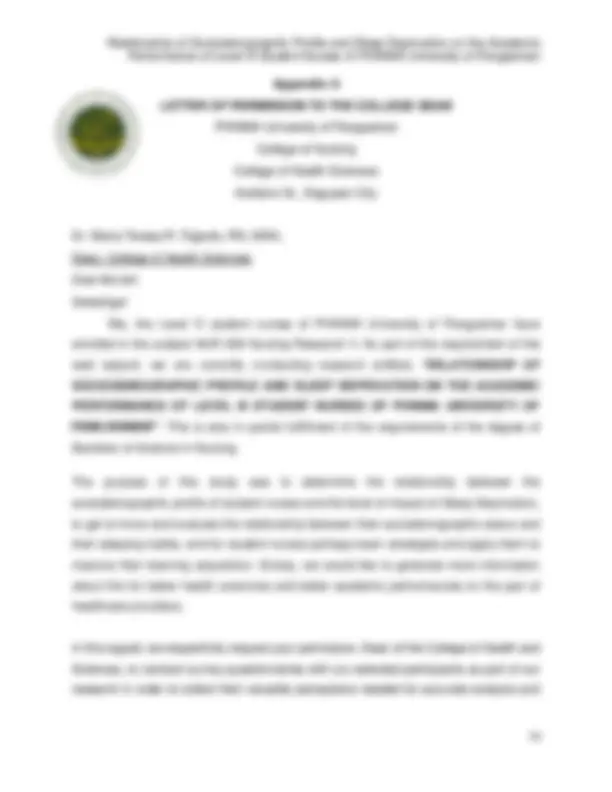
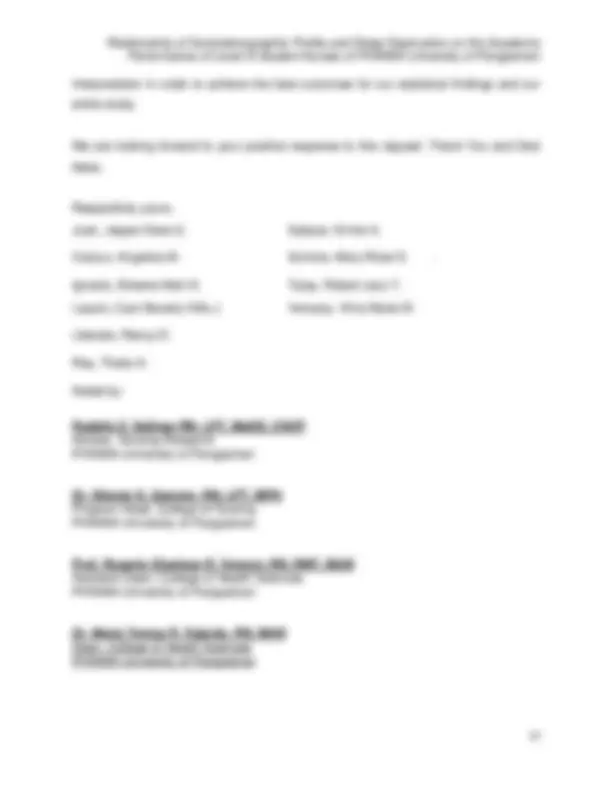
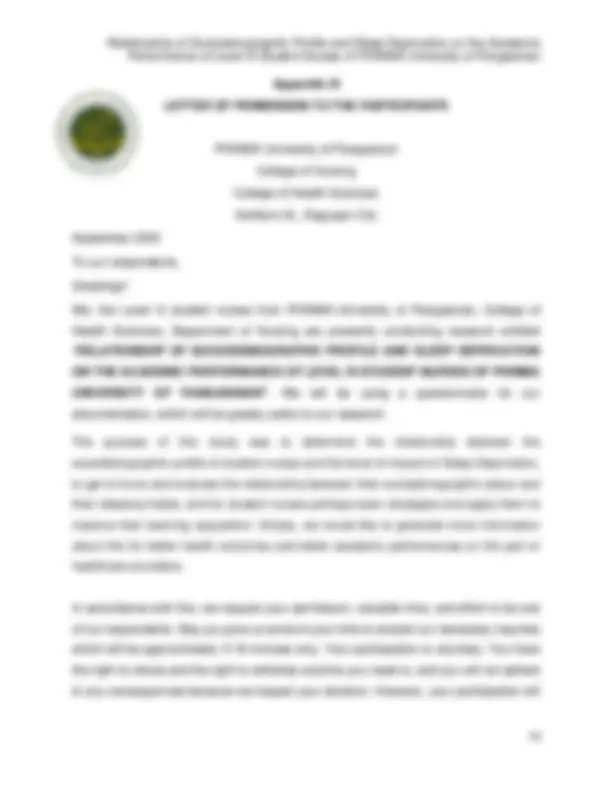
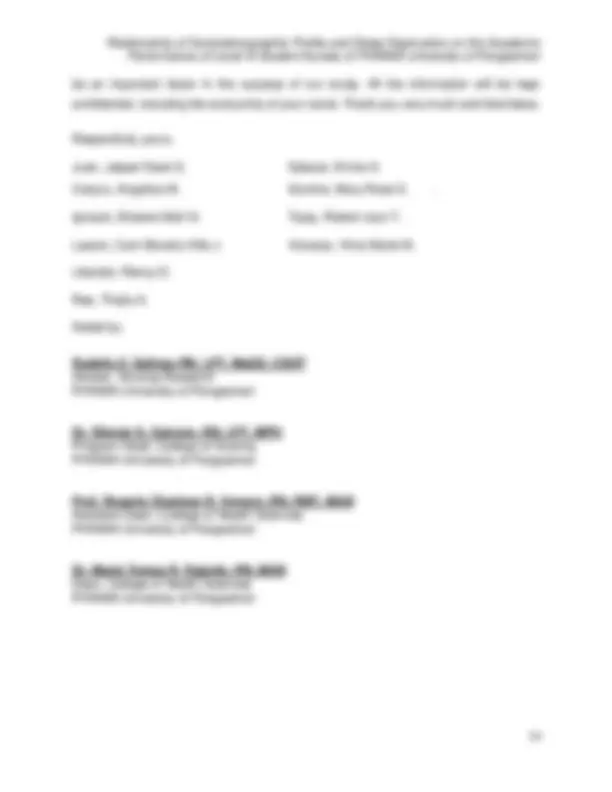
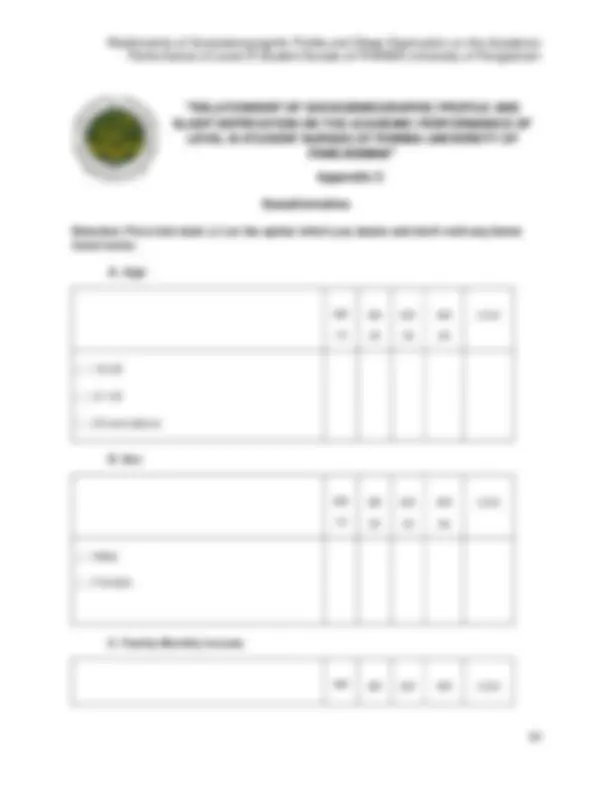
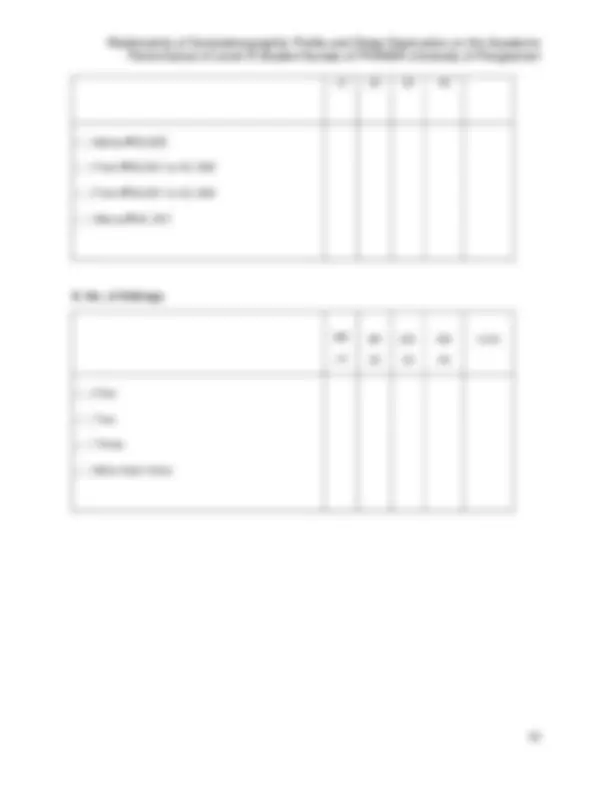
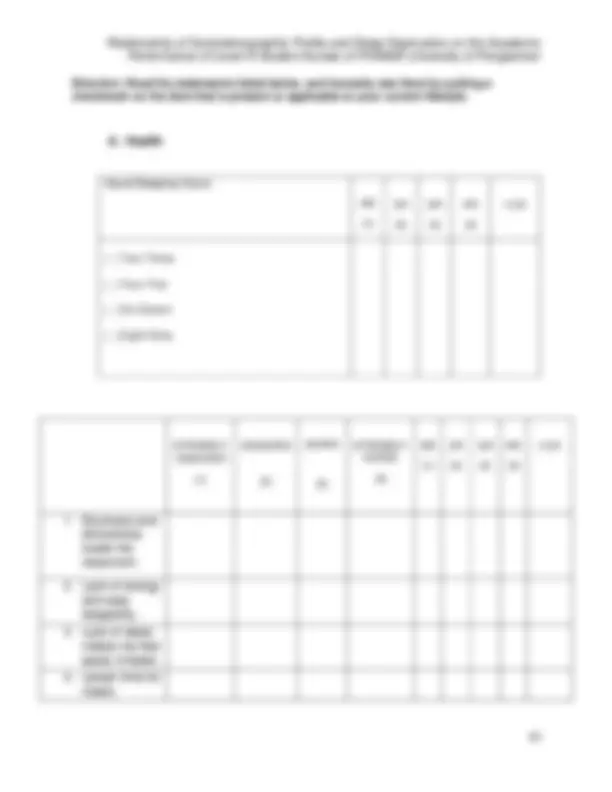
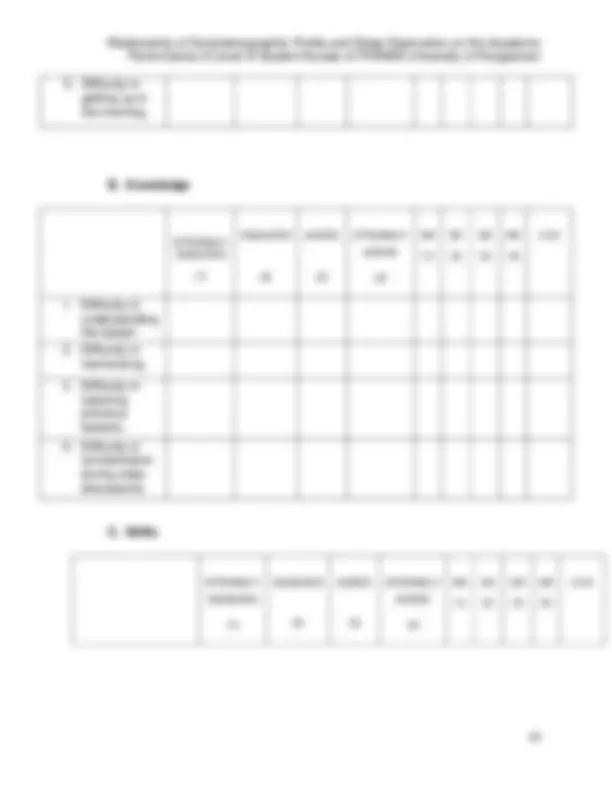
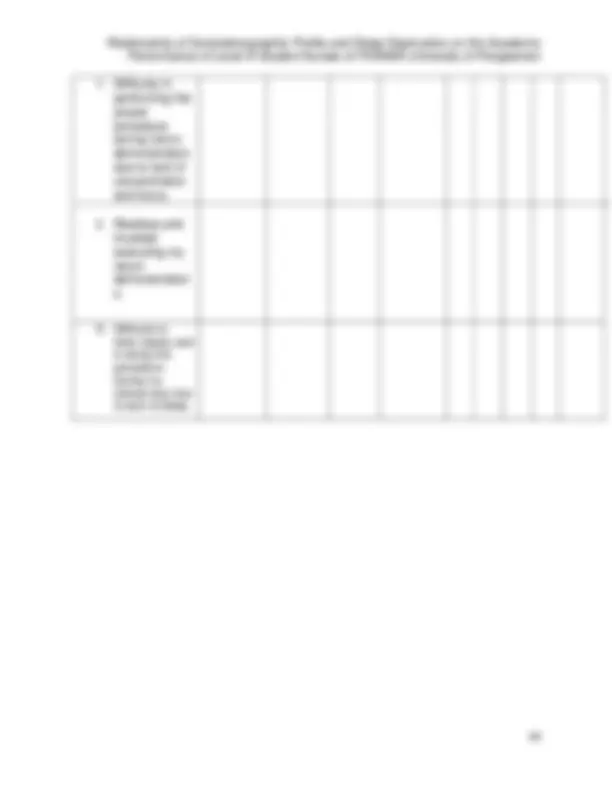
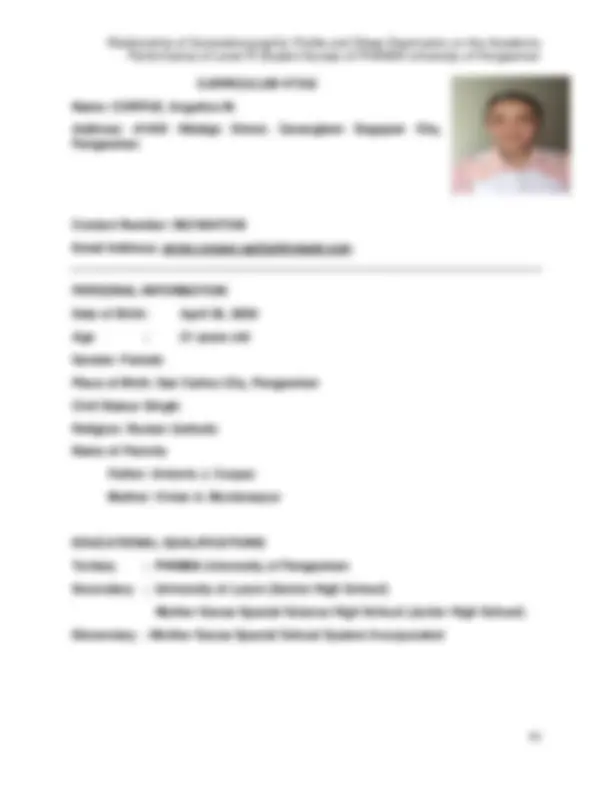
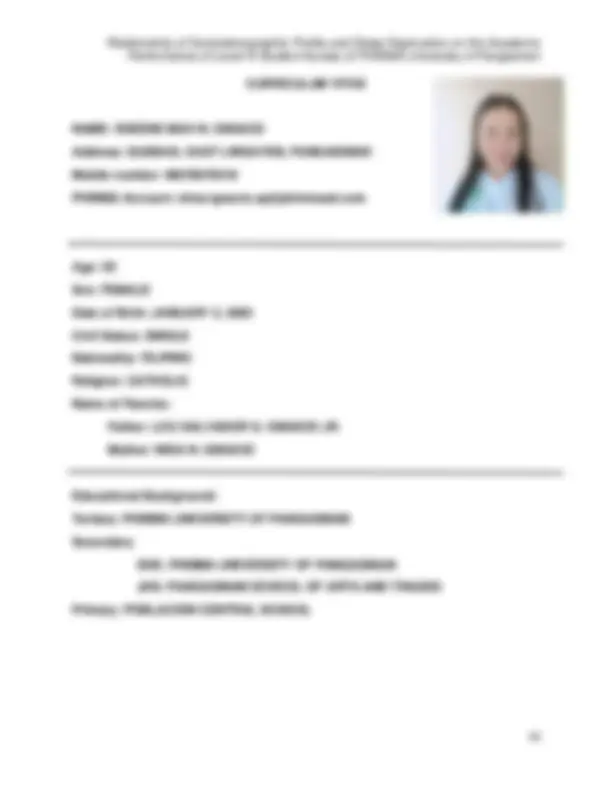
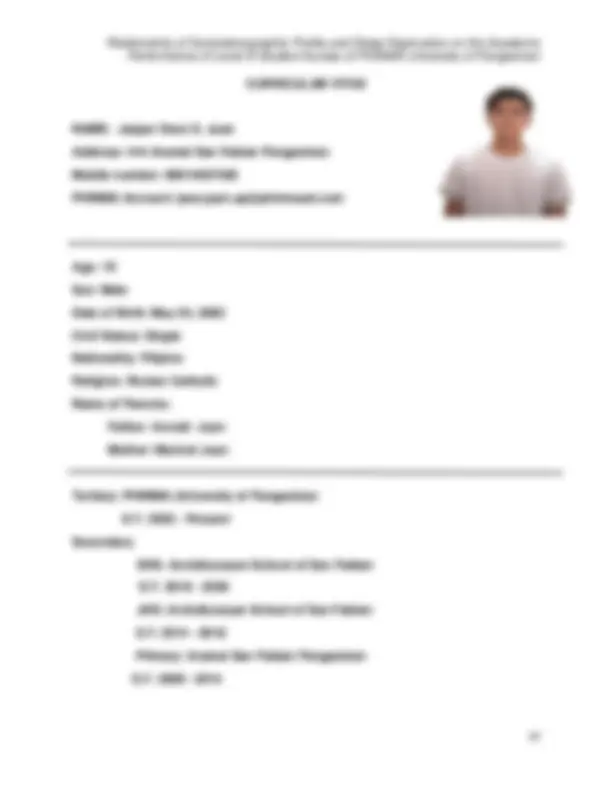
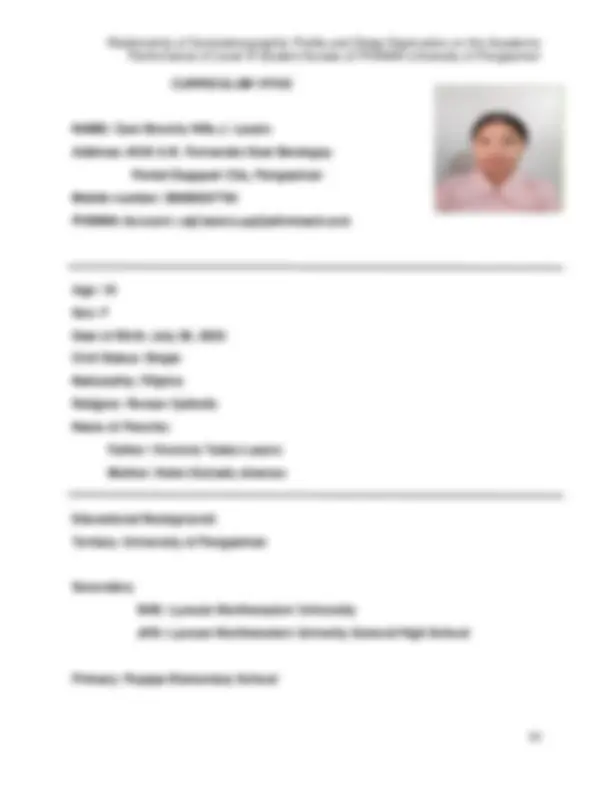
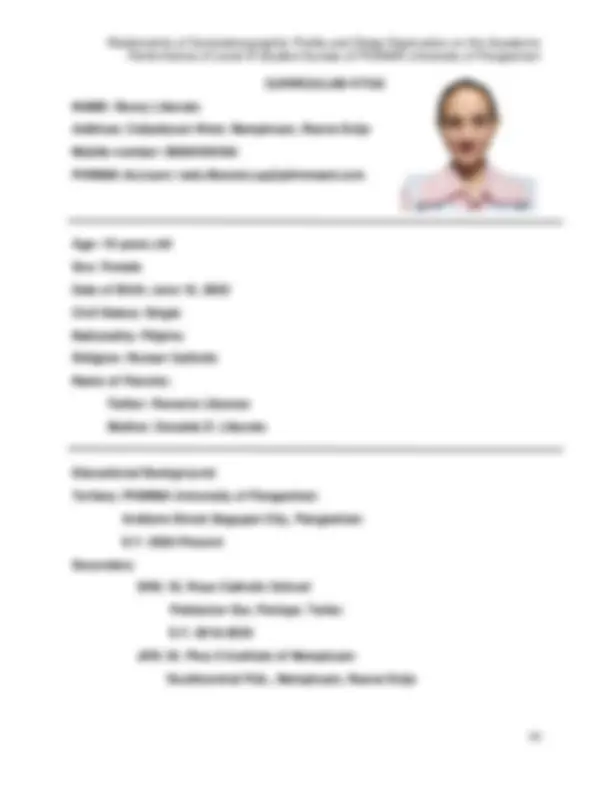
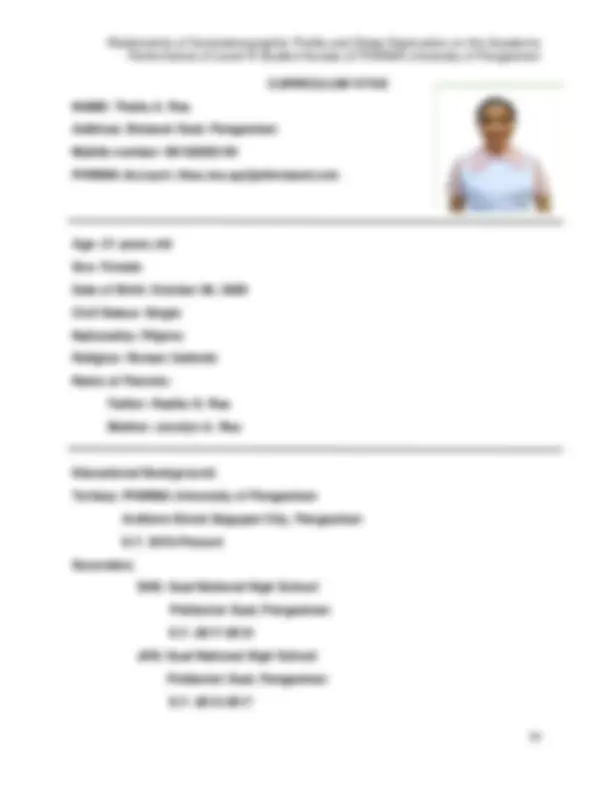

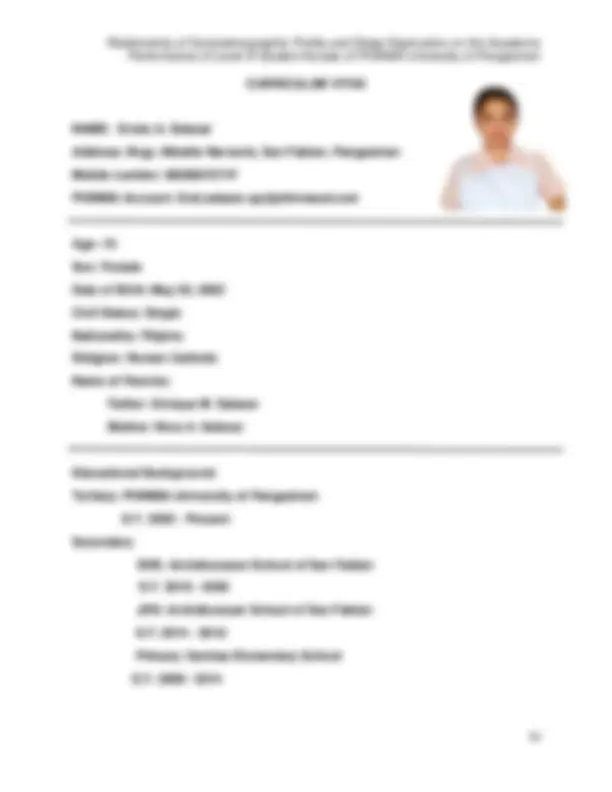
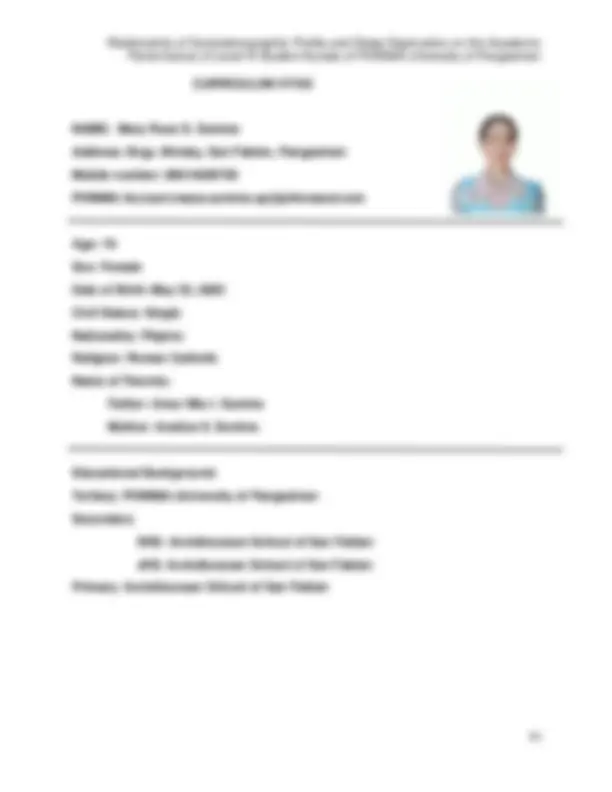
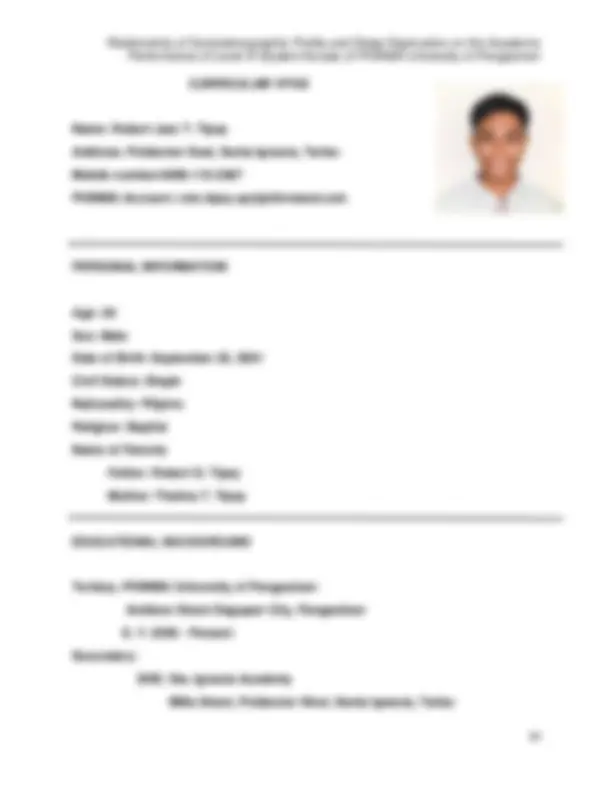
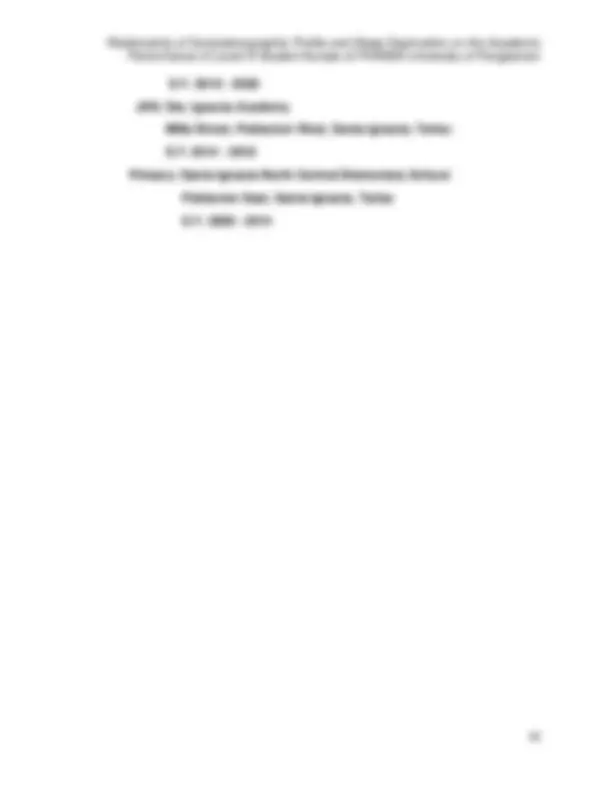
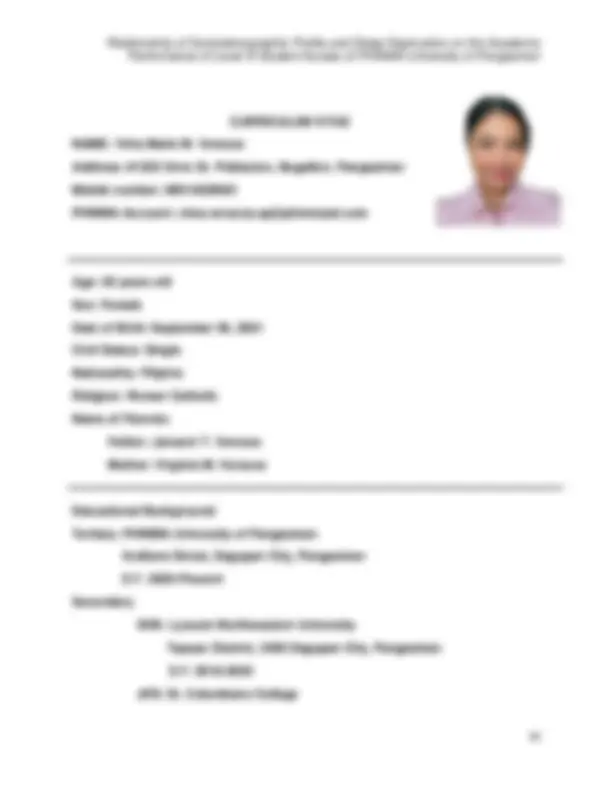
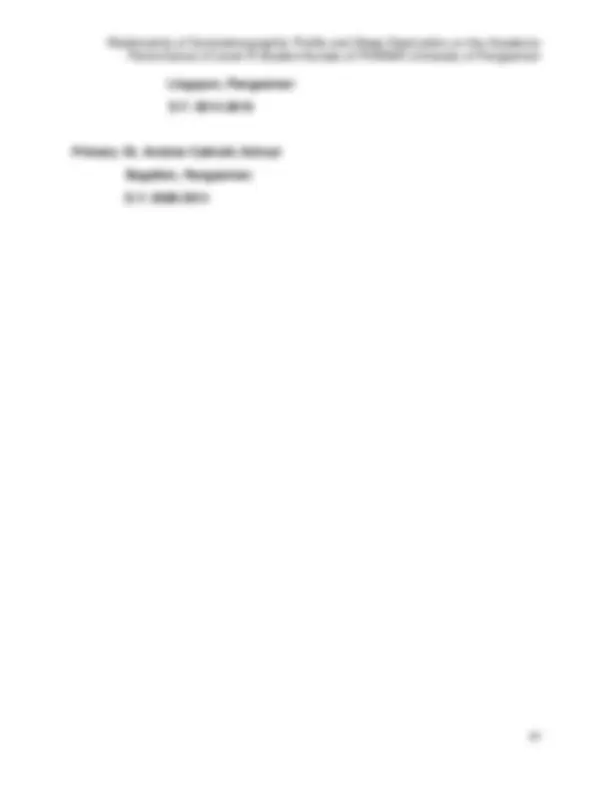
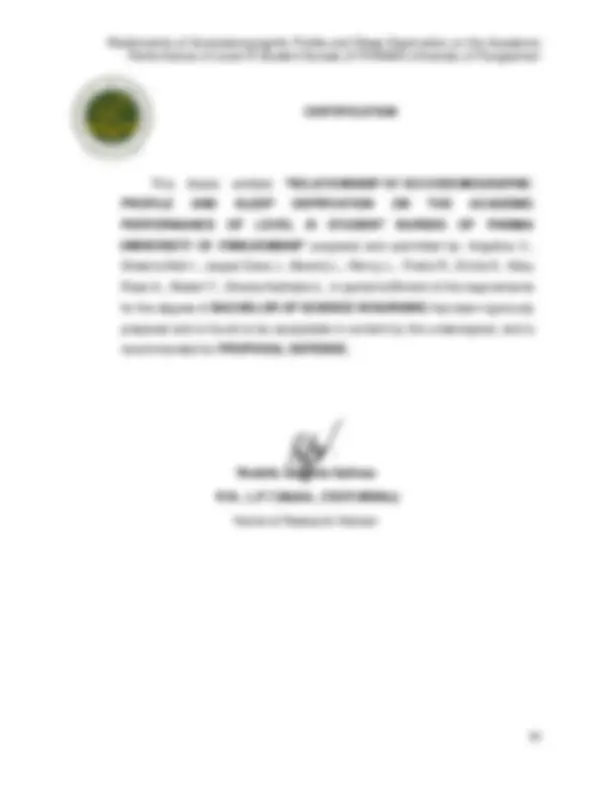
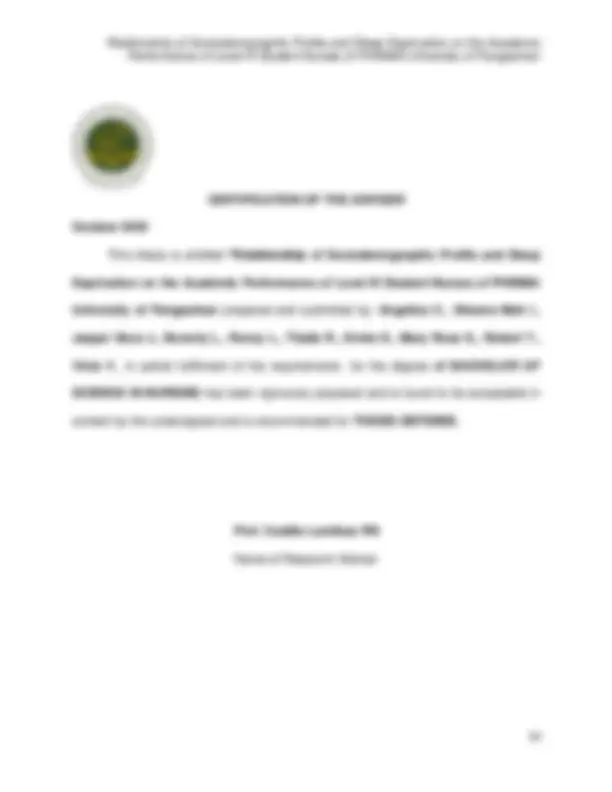


Study with the several resources on Docsity

Earn points by helping other students or get them with a premium plan


Prepare for your exams
Study with the several resources on Docsity

Earn points to download
Earn points by helping other students or get them with a premium plan
Community
Ask the community for help and clear up your study doubts
Discover the best universities in your country according to Docsity users
Free resources
Download our free guides on studying techniques, anxiety management strategies, and thesis advice from Docsity tutors
Research regarding the lif experiences of student nurses.
Typology: Thesis
1 / 99

This page cannot be seen from the preview
Don't miss anything!





























































































On special offer
Performance of Level III Student Nurses of PHINMA University of Pangasinan
In Partial Fulfillment of the Requirements for the Degree BACHELOR OF SCIENCE IN NURSING By Student Name Juan, Jasper Dave S. Corpuz, Angelica M. Ignacio, Sheene Mah N. Lazaro, Cam Beverly Hills J. Liberato, Renzy D. Rea, Thalia A. Salazar, Ermie A. Somine, Mary Rose S. Tipay, Robert Jazz T. Versoza, Vinia Marie M.
Performance of Level III Student Nurses of PHINMA University of Pangasinan THE TABLE OF CONTENTS Title Table of Contents 2 Acknowledgement 8 Dedication 9 Abstract 10 CHAPTER I - The Problem and Its Background Rationale 11 Theoretical Framework 13 Conceptual Framework 14 Statement of the Problem 16 Basic Assumptions 16 Significance of the Study 17 Scope, Delimitations and Limitations 18 Definition of Terms 19
Performance of Level III Student Nurses of PHINMA University of Pangasinan focus Table 4. b Restless and troubled executing my return demonstrations 59 Table 4. c Difficulty to think clearly and in doing the procedure 59 during clinical duty due to lack of sleep Table 5. a Relationship between sociodemographic profile 60 and Usual sleeping hours Table 5. b Relationship between sociodemographic profile 61 and Feeling of dizziness and drowsiness inside the classroom Table 5. c Relationship between sociodemographic profile and 61 Lack of energy and easy fatigability Table 5. d Relationship between sociodemographic profile 62 and feeling of easily irritated Table 5. e Relationship between sociodemographic profile 62 and Lesser time for meals Table 5. f Relationship between sociodemographic profile 63 and Difficulty in getting up in the morning Table 6. a Relationship between sociodemographic profile 63 and Difficulty in understanding the lesson
Performance of Level III Student Nurses of PHINMA University of Pangasinan
Our profound gratitude goes to Almighty God, the creator of all mankind, for Giving us faith, favor, grace, strength, and inspiration from the beginning of the study to The end. And for a successful project well done. We would like to express our deep and sincere gratitude to our 1st^ Research Adviser Prof. Rodelio Salinas. Our immense appreciation goes to our honorable Nursing research Adviser Prof. Ceddie Lomibao. Their sage advice, insightful criticism, and patient encouragement greatly aided in the Writing of this research in innumerable ways. We, the researchers, would also like to acknowledge the support of our participants who participated in this study. We also appreciated the fervent support of The College of Health Sciences while conducting our research in the College of Nursing. We would also like to give thanks to everyone who helped, supported and guided Us along the way. Finally, credit goes to all of the members of the research team who put in the Time and effort for this study and contributed what they could to make it a success. Thank You! All glory to the GOD above.
Performance of Level III Student Nurses of PHINMA University of Pangasinan
This study primarily aims to determine the relationship between the socio- demographic profile and sleep deprivation on the academic performance of Level III student nurses of PHINMA University of Pangasinan. The problem statement relies on the effect of being sleep deprived according to sex, age, number of siblings, economic status, health, and academic factors. The research design used in this study was descriptive-correlational method research. The researchers began with a quantitative study using online surveys via Google Forms to determine the impact of sleep deprivation on students' academic performance and whether such effects are significant in their daily lives. One must also be able to recognize their level of sleep deprivation and what causes it. The researchers will use random sampling in the quantitative aspect of the study wherein, it allows all the units in the population to have an equal chance of being selected. The researchers selected this type of sampling technique because it suits based on the nature of the researchers’ study. The researchers want to learn more about students' sleep habits, academic performance, and a variety of other health factors. The given study had a maximum of 223 respondents who were randomly selected third-year nursing students from PHINMA-University of Pangasinan, enrolled in the academic year 2022-
Performance of Level III Student Nurses of PHINMA University of Pangasinan
Rationale Sleep is a state on which the body and mind of an individual is relatively inactive and its muscles are relaxed. In the human body, sleep aids with all the cognitive function such as: memory learning decision making, and critical thinking. Sleep is also said to be a physiological adaptation to conserve energy. With enough sleep, an individual can function better and the condition of which an individual suffers from lack of sleep is called sleep deprivation. Sleep is vital and plays an important role in human system. According to the National Sleep Foundation (2015) an individual needs at least 7 to 10 hours of sleep to store energy and be able to function properly. It helps people work at an ideal level and is used for critical processing of the brain. This makes sleep necessary on academic performance. Being able to understand the impact of sleep deprivation on academic performance will aid in comprehending the importance of sleep especially for students to maintain a quality academic performance. In maintaining a good academic performance, an individual should also recognize factors that can either help or hinder his goal. And as said beforehand, sleep plays a vital role when it comes to academic performance, a sleep deprived individual is/can be dysfunctional during day time, therefore, there are chances of having low academic scores and because of experiencing sleep deprivation, and one could experience flunking. According to Leonidas (2014), a medical news report from America stated that school stress keeps 68 percent of students awake after their head hits the pillow. Only 30 percent of students sleep eight hours a night, the average recommended amount of sleep for young adults. Twenty percent of students pull an all-nighter at least once a month. The purpose of adequate sleep is to maintain better memory and boost learning. Sleep loss means mind loss. It restricts critical thinking, messes up memory and mood, delays reasoning, and shutters quantitative skills. In the Philippines, Arceo-Dumlao (2014) have said that based on the research done by Sun Life Financial Asia, almost half of the Filipinos sleep less than six hours a day. Poor quality sleep has significant impacts on
Performance of Level III Student Nurses of PHINMA University of Pangasinan apply the learning or lived academic experience of the respondents of the study and find the right strategy that they should employ when learning. Theoretical Framework According to Sister Callista Roy, an American nun, nursing theorist, professor and author who created the model known as Roy’s Adaptation Model (RAM), theorized that all individuals are biopsychosocial beings who constantly adapt to various stimuli (Akinsanya, 1994). These three stimuli include focal, contextual, and residual stimuli. In order to cope with a changing environment, this theory utilizes a problem-solving approach. The goal is for the individual to adaptively respond to environmental changes. Adaptive responses and level of stimuli both influence one another. Pertaining to the three categories of stimuli, this theory describes the manner in which an individual responds to changes in their environment. Focal stimuli are the internal or external stimulus that confronts the person the most, it is the object or events that attracts the most attention. Contextual stimuli refer to the environment and society. Contextual stimulus and focal stimuli work together, and they influence the overall response of the individual. Residual stimuli refer to past experiences, beliefs, or attitudes rather than immediate ones. The person may not be aware of the influence of these factors, but they always affect current behaviors. Together these types of stimuli allow the individual to create the skills and reflexes needed to adapt to their environment (Akinsanya, 1994). With regards to sleep deprivation and environmental examples of stimuli, sleep deprivation would be considered as a focal stimulus. Sleep deprivation can immediately impact responses to an individual's environment, as it can affect the quality of life and overall health. Contextual stimuli would contribute to a lack of sleep. Examples of this type of stimuli are related to sleep hygiene, such as loud noises, bright rooms, consumption of caffeine, and use of electronic devices. Residual stimuli are additional stressors that result from personal conditions or events. With an understanding of Roy’s Adaptation Model (RAM), researchers can focus on how to combat sleep deprivation by targeting the three types of environmental stimuli that impact sleep. Callista Roy’s Adaptation Model (RAM) was used to provide further information regarding the broader
Performance of Level III Student Nurses of PHINMA University of Pangasinan effects of sleep deprivation on the human body. Roy’s model emphasizes that a person is in constant interaction with the changing environment and that to cope with the changing environment, one must use adaptive mechanisms (Nayback, 2009). Thus, Roy Adaptation Model identifies four methods used to adapt to the environment: physiological, self-concept, role function, and interdependence. Conceptual Framework Understanding the Relationship of Sociodemographic profile and Sleep Deprivation on the Academic Performance among Level III Student Nurses is an understudied phenomenon. Sleep plays an integral part for students’ well-being because it assists in the process of learning and retaining information (Anjum, Bajwa, & Saeed, 2004). This study was theoretically rooted to Brain Plasticity Theory elaborated by Dr. Robert Stickgold (2007). Sleep researchers study the role of sleep in learning and memory formulation in two ways. The first approach looks at the different stages of sleep (and changes in their duration) in response to learning variety of new tasks. The second approach examines how sleep deprivation affects learning. Low-quality sleep and sleep deprivation also negatively impact mood, which has consequences for learning. Alteration in mood affect our ability to acquire new information and subsequently to remember that information. In this research, the researchers used the input, process, output theory that showed how the instruments have been planned (input), and how the research has been executed (process), in order to formulate results (output). The researchers have conducted the figure below to show the process among the variables used in the study.
Performance of Level III Student Nurses of PHINMA University of Pangasinan STATEMENT OF THE PROBLEM This study determines the relationship of sociodemographic profile and sleep deprivation on the academic performance among Level III student nurses. Specifically, it sought to answer the following question:
Performance of Level III Student Nurses of PHINMA University of Pangasinan Significance of The Study The importance of this study is to get accurate information about the relationship of socio-demographic and sleep deprivation in academic performance among level III student nurses. The findings are beneficial to the following: Student Nurses – This study is primarily important to student nurses of University of Pangasinan to have an awareness and knowledge about the negative impacts of sleep deprivation in their academic performance. Parents – This study is also beneficial to the parents to gain awareness on how sleep deprivation affects their children’s academic performances. Nursing education - The importance of this study helped the student nurses to learn more about the negative impacts of sleep deprivation, most especially in their academic performances. Nursing research - This study may serve as a basis for future research that they will conduct for it will be useful as reference and guide among researchers who are planning to conduct any study that is related to the said topic. Nursing practice - This study will be valuable to nursing practice because it will give them a better point of view of how important it is to be aware and knowledgeable enough about the negative impacts of sleep deprivation in academic performances among student nurses.
Performance of Level III Student Nurses of PHINMA University of Pangasinan Definition of Terms ACADEMIC PERFORMANCE- the measurement of student achievement across various academic subjects. (Ballotpedia, 2009) BRAIN PLASTICITY- It is the nervous system's ability to reorganize its structure, functions, or connections in response to intrinsic or external inputs, allowing it to modify its activity. (Mateos-Aparicio P and Rodríguez-Moreno A, 2019) SLEEP - a natural temporary state of rest during which an individual becomes physically inactive and unaware of the surrounding environment and many bodily functions (as breathing) slow. (Retrieved from www.merriam-webster.com, March 20, 2022) SLEEP DEPRIVATION - a state caused by inadequate quantity or quality of sleep, including voluntary or involuntary sleeplessness and circadian rhythm sleep disorders. (Retrieved from Better Health Channel, March 20, 2022) STUDENT NURSES - it is a student, who is undergoing training or studies in the nursing profession. NEGATIVE BEHAVIOR - anti-social behavior, a behavior which is not acceptable by society and that can cause harm to the well-being and the image of the society. (Retrieved from Classhall.com, March 20, 2022) HEALTH - is a state of complete physical, mental, and social well-being and not merely the absence of disease or infirmity. (WHO)
Performance of Level III Student Nurses of PHINMA University of Pangasinan
This chapter presented the related literature and studies found after the researchers conducted a thorough and in-depth search for their proposal, which was titled Relationship of Sociodemographic profile and Sleep Deprivation on the Academic Performance of Level III Student Nurses of PHINMA University of Pangasinan. Conceptual Literatures The following concepts were taken from online articles which enriches the researcher’s study on Relationship of Sociodemographic profile and Sleep Deprivation on the Academic Performance of Level III Student Nurses of PHINMA University of Pangasinan. In addition, it includes local and foreign concepts. Local. The essence of sleep is to keep life in balance, ensuring that energy used during the daytime will also be replenished by resting at night. However, when sleep is interrupted and unable to achieve a blissful rest, it may compromise the health and unfolding tasks that teenagers need to accomplish. In today’s modern society, the average college student is sleep-deprived more than ever. Sleep deprivation is the situation or condition of suffering from a lack of sleep. Sleep deprivation is real, and only researchers are the only ones who know it is a big problem throughout colleges and universities worldwide. Sleep deprivation has many factors leading to it, but also has just as many effects. Some impacts of sleep deprivation can be mental and emotional health, sleep quality, and sleep problems. Students need to know how important sleep is and why they need more sleep than what they perceive they need. One major phenomenon that has been gradually eroding the health of the Philippines is the lack of sleep. From the effects of unbearable traffic to the explosion of the business process outsourcing industry to the geometric rise of Internet usage nationwide, millions of Filipinos are choosing to sleep less and less, with dangerous effects. We seem to think that staying awake to finish work is the lesser evil. It isn’t. It is a danger we have to address, and soon.